#but I am a fan of literal translation and the language is STILL poetic even without rhyme
Text
I love all the footnotes explaining the cultural references and language specific puns in the fan translation of Yuwu. You really feel the dedication and care put into the translation. I am continually awed by the generosity of fansubbers/translators throughout my years as a fangirl. I mean, dramas are hard enough, but an entire novel? Especially when some novels have hundreds of chapters/thousands of pages? Amazing.
Also, it’s so much harder translating a novel than a drama (usually) because of all the references, metaphors, poetic language etc. (with the exception of Word of Honor I suppose) . Like how do you translate a culturally specific idiom into another language that does not have that history/context to pull from while still properly conveying the same sentiment? Even when looking at professionally translated novels, some translations are much better than others i.e. if you buy the bad translation of crime and punishment, good luck trying to navigate all the clunky and awkward sentences.
I took a Japanese linguistics/translating class in college and let me tell you, it is such a bitch and pain in the ass to try to do a good translation. You nitpick and agonize over two words that in general mean the same thing but have such different connotations. And sometimes literal/direct translations of the words are so terrible in the new language, you have to come up with an entirely different phrasing that still conveys the author’s original intent/idea/emotion/etc. Or, I guess you can just be lazy and use western specific phrases that don’t fit the setting of the work (*cough*netflix).
Anyway, it’s amazing that fan translators put in all this hard work to give us good translations and they do it all for free.
19 notes
·
View notes
Text
Fic Writer Questions!
I was tagged by @peter-covinskys, thank you!! 🥰
1) How many works do you have on AO3?
eighty-five !!!!!!!!!!! if only i remembered how to write so i could reach one hundred rip
2) What’s your total AO3 word count?
exactly 337,220. not much but it's honest work
3) How many fandoms have you written for and what are they?
in total 6-ish
harry potter, percy jackson, doctor who (kinda), young justice/dcu, rpdr, to all the boys
4) What are your top 5 fics by kudos?
747: It's what friends do - Young Justice (Birdflash)
626: Possibly, Maybe - RPDR (Trixya)
434: Searching, Waiting, Looking - RPDR (Trixya)
428: It only takes a taste - RPDR (Trixya)
338: When no one else was looking - To All The Boys (Covinsky)
5) Do you respond to comments, why or why not?
always!!! responding to comments is one of my favorite parts of the fic process!!!
6) What’s the fic you’ve written with the angstiest ending?
i am a fluffy/happy ending person through and through so i was inclined to say "none" when i remembered i have this one sad (alternate)ten/rose fic that i just reread and while my english was atrocious back then and i truly intend on going back and fixing it, it's pretty poetic and angsty i think
So far we are... so close - Doctor Who
7) What’s the fic you’ve written with the happiest ending?
literally all of them except for the one above and "gone tonight" which is sort of open ended lmao. but i'm gonna go with SWL bc it's a multichapter and i wrote a whole epilogue of fluffy so
8) Do you write crossovers? If so what is the craziest one you’ve written?
i don't and i don't think i ever will but i do think about my favorite characters interacting a LOT. my most constant scenario is a hospital au with all of my main ships, i have everyone's specialties in my mind and i revisit scenes often, it's wonderful
9) Have you ever received hate on a fic?
full on hate, never, but there were two instances that were kind of funny:
- i was partaking in a fic forum contest with the theme "meta" so i wrote a meta fic (fics that mention the existence of that universe fanfic within it) and i tagged it and all and someone left me a lengthy comment about how much they hate meta fics and i was like??? ok???
- i have this cute little piece called glasses where percy "steals" jason's glasses and goes to the canoe lake and annabeth tries to retrieve them and they get all cute and kiss once (1) and someone left me a comment asking how dare i post such explicit content in a fic rated K? ASDFHDJSHSH
10) Do you write smut? If so what kind?
sometimes! it's difficult for me and not something that i find fits most of my stories, but sometimes it does and it flows well. i've written some, but it's in the lowest percentage of my writing
11) Have you ever had a fic stolen?
oh boy, have i. a few times. last two times were separate occasions, months apart, but by the same fucking person. wattpad is fucking hell. they changed the names and just posted it to another fandom.
12) Have you ever had a fic translated?
once but it fits better into the previous question: one time i was searching the percabeth tag (that was like years and years and years ago) and there was this little drabble in portuguese (my mother tongue) and i started reading it and it was SO familiar and i was like wait a minute this is mine??? so like i wrote it in portuguese, then translated it into english myself, and someone without asking for permission or crediting me translated it back into portuguese and posted it as if it was theirs. it was a ride
13) Have you ever co-written a fic before?
no and i think im too controlling to ever do that
14) What’s your all time favorite ship?
that would be mister perseus jackson and miss annabeth chase aka literally the best otp that has ever existed they love each other so much and they will live a full life of happiness and that's all i have to say
15) What’s a WIP that you want to finish but don’t think you ever will?
omg so many... im still in the hopeful stages for all the ones for my current fandom (tatb) so let's skip that and go to previous fandoms:
the trixya jealously one. i have like 8k of it and i liked it so much. it's so far from done. i wish i could finish it.
the hinny spy au. i loved when i had that idea. god that was such a long time ago rip
and the fake death yj au. god i wish.
16) What are your writing strengths?
right now i feel like it's nothing tbh, and i'm doing this to be dramatic or fishing for compliment, it's just been such a long period of writer's block that everything in writing seems weak to me right now. i am however much better at scenes with only two characters, the more people you throw in there the more likely i am to screw it up
17) What are your writing weaknesses?
as mentioned, any scenes with lots of people, but also may i say: ENDINGS. ending a fic is literally the hardest thing on the planet i don't understand how people do it smh
18) What are your thoughts on writing dialogue in other languages in a fic?
i like it if it fits the characters/story but i absolutely hate not knowing what they're saying or having to wait for the author's note, so i'm a fan of putting the translation immediately after if you're gonna do that
19) What was the first fandom you wrote for?
harry potter.......... we've been there folks
20) What’s your favorite fic you’ve written?
how can a person even choose this....... i'm proud of so many of mine. if i had to pick one right now i'd say "Just fall into place (you'll fall into me)" bc i wrote the type of fic that i love finding in my other fandoms and it felt like such an accomplishment. but im proud of many of them
i'm tagging @promiseofthepremise @scarletenvy @xgoldendays @byima and whoever else writes fic i totally lost sight of that in here sorry folks!!!
6 notes
·
View notes
Text
V3 Prologue Replay 0.1- It’s Time to Wake Up
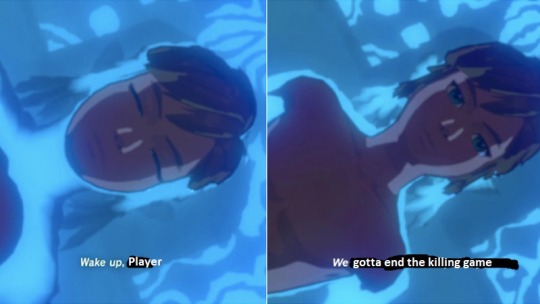
Well, guess this is happening now.
Hello there. I figured I might as well write down things I picked up on during my replays and discussions with others, as well as some translation issues I (and many others from what I’ve seen) have noticed throughout out the game, with some fun trivia along the way too. This is mainly for the sake of my own peace of mind than anything, as I haven’t properly went through the game chapter by chapter in order recently, and I mainly compared translation as bits and pieces than going through line by line.
I will be recording the game both in English and Japanese to compare the lines and comment on differences if they seem of worth to note, which honestly most of it isn’t given that in terms of adapting the language in a natural sounding way -as a localization- they did a pretty good job. Most issues seems to come from lack of communication between the team in terms of context of some lines, but that’s mostly on the management of the team and I don’t have the insider’s knowledge beyond knowing that they were given some characters/sections of the game to translate so I can’t exactly comment on what was going on there.
For the trivia bits, please do keep in mind that it is me being nitpicky as a translator myself, and that I’m only pointing those out as how I would personally prefer those to be translated but at the end of the day, it really does come down to preferences since they do communicate the main thing they are trying to relay and unlike context relevant errors that do in fact cause geniune harm to gameplay and player’s experience (ie. inconsistencies in translation making Trial 5 a confusing mess) they are more what it says on the tin- some extra info/context on things.
All that said, let’s start~
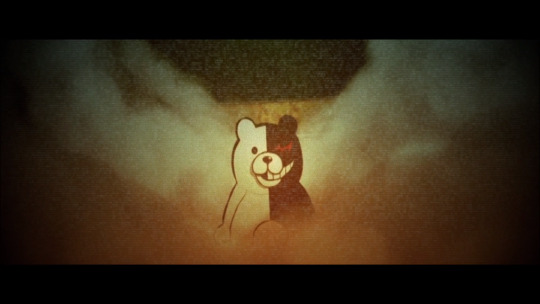
Here we start with a shortened version of the V3 promo we will see in trial 6, as well as the V3 opening. Before I move to the latter though, I do want to note that for the “This story is not over” part, the Japanese counterpart uses “物語は終わらない” which due to the verb tense has a heavier “This story won’t end” vibe, which Monokuma kept insisting on in trial 6 as well.
It is not a big thing but simply a nice touch with the bold claims they make throughout the game on how it will never end.
It is also worth touching on given that one commenter in trial 6 was saying that it’s been three years since last season, so it is a bold “come back” line by whoever the group running this season 53 is.
Beyond that, it is just a nice recap and I personally love how the music blends fairly well together.
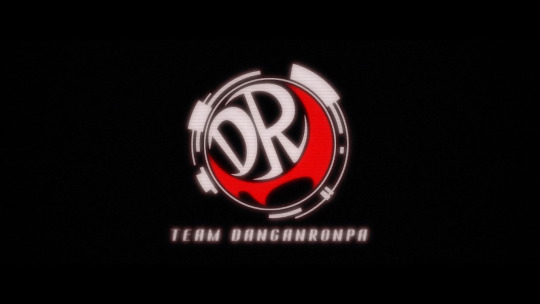
Hello there, “Team Danganronpa”. Still love how this spoiler was staring at us in the face entire time.
For the actual opening Tsumugi having a red string (of their fates) at hand and Rantaro being the only one who becomes one with their shadow to have pink eyes open was a nice touch.
The character in that pink blinking eye that for some reason wasn’t translated is the kanji for “lie” (嘘) btw. Also nice touch with Kaede facing the culprits in that blink and you will miss it scene before they dissolve to letters.
Tsumugi and Rantaro being on top of the slot machine just like how Monokuma’s ‘throne’ is between their trial stands is nice too.
The opening, which was supposedly used in-game as show intro as well, having the meteorities and that talent suppressing machine for the Ultimate Hunt plotline is of worth noting too. It is easy to dismiss the Gofer Project plotline for us players now, but the show was genuinely going for that angle before Kokichi’s takeover, hence it is worth keeping in mind while going through first four chapters especially.
For the game name, this is sort of a dead horse at this point but “Killing Harmony” rather than “Everyone’s [Mutual] Killing School Semester” was likely used due to character limit, so they had to get creative with an alternative subtitle. Character limit is a genuine issue translators face with especially with a language like Japanese and why we end up things like Yasuhiro telling us to call him Hiro or Korekiyo saying we can use Kiyo.
It is also interesting that they play the show intro twice in the prologue, one before and after their memories were altered by the flashback light, and given Monokuma when he appears later saying that this prologue was going on too long, it seems like whoever was in charge of that (supposedly Monophanie, if kubs indeed have their own AI, or the person using the avatar of said bear) messed up so they had that version aired unintentionally, hence having to go for an intro again later.
And now it’s time to wake up for one antenna girl.

If this part felt pretentious and weird to you when you first read it, don’t worry it is just usual “Kodaka trying to go purple prose except it comes off really awkward especially in English” and the translator chose to simplify a good chunk of it, going “yeah we ain’t doing that here” and I can respect that tbh.
But just for the sake of having it here: A more literal translation of that part would be “There is nothing here yet. No light, no sound. Nor my form or voice. Nobody knows who I am yet. Who I am? Who am I? I reach out a hand. A hand that doesn’t belong to anyone yet. To grasp my own existence- This is me. My name is Kaede Akamatsu. I finally recognized who I am. ...Nice to meet [you,] me. Miss protagonist of this crazy story.”
Again, a few things are just reworded to sound natural in English for the localization’s take, but if the line “Nice to meet... me” confused you before, that’s because translator went half way cutting out Kodaka waxing poetics on regaining consciousness, so taking off the subject in translation makes it sound weirder when she suddenly seems to start to talk to herself.
Also, the heavy protag framing with her and Shuichi honestly did more harm to the game than good, at this point. It would be better if they started off without that last line, as it would blend better with unreliable narrator we just happened to see events from the POV gimmick way better. Same goes for Demo having her, Hajime and Makoto sharing the “Protagonist Room” and how much hype they caused by actively pushing that angle. Part of that was preserving the twist, yes, but I also get why people do feel like it was meant as a “take that” as well.
It also did not help with people recognizing that we were playing as “side characters” the entire time as far as in-universe story plotted by this TDR was concerned too, since Kiibo was set to be the in game Naegi-expy protagonist of the season.
But enough of that for now, because we have a title card to tackle.
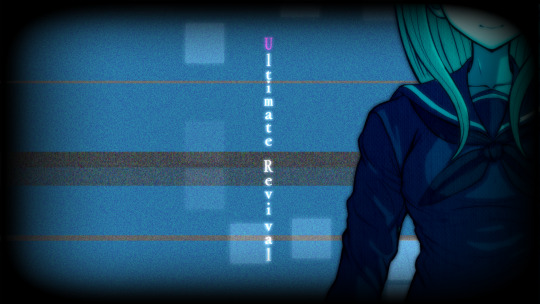

蘇る超高校級
I have to admit, revival probably was the best choice to use there as looking back now, there are a few things this is refering to-
1-) The simpler explanation of how they supposedly had their memories sealed, hence the “restoring/bringing back memories” meaning of 蘇る, which also means “reviving” the title of Ultimate in the Gofer Project plotline universe given how they were supposedly last survivors of the earth and
2-) How this is a revival of Danganronpa, going again with the fact that show stopped for three years/some people were awaiting for a new season for a while now, hence the resurrection/revival of Danganronpa and by extention, the concept of Ultimates by using that meaning of 蘇る in that way too. After all, “Ultimate” is really just “Best in X field amongst other highschoolers” title (as commonly fan-translated and iirc even made it to anime subs as “Super High School Level”), so having high schoolers who are given memories and the title to match with it is reviving that.
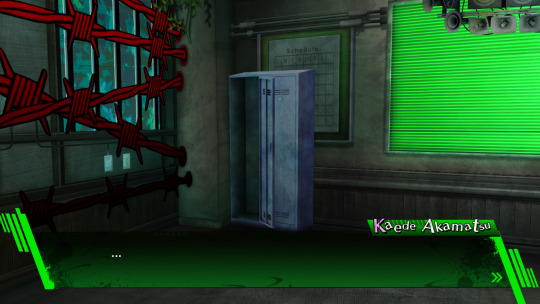
Finally out of the closet locker, and before we move on, I want to add another side note that when you invert the UI, pre first flashback light UI turns a familiar pink.

While one reading of this could be that this lie magenta being the inverted version hints at prologue being a lie, I personally take it as due to the inverted color being the one we see, it means the prologue has the “truth” than later parts, since in trial we have blue truth bullet changing color to become pink lie bullet theme, that the color they are inverted to being opposite of what they are simply makes more sense to me.
We will see when we return to this locker again later that our UI changed to yellow which inverts to blue, reverse of truth, which is especially poignant with Tsumugi’s later trial 6 comment on “if they will call fiction a lie, then all their actions and words were indeed all just lies, since they were performed based on things some people wrote, fiction, too.
It changing immediately after we are shown that first light simply felt too relevant to not tack this on here, but moving on-


A mood tbh
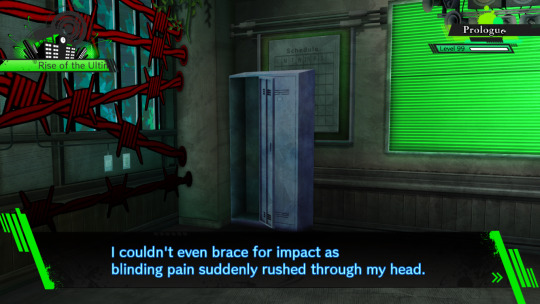
Poor girl, honestly. This is not even the only time she will end up hitting her head when we are done with prologue.
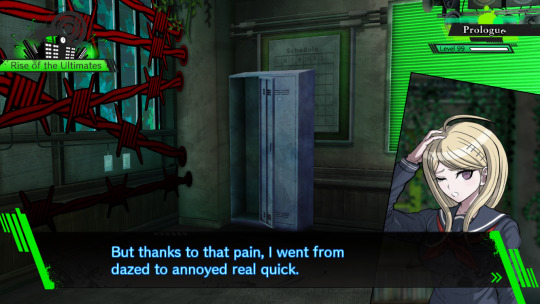
A bit of a short fuse there, but also fair.
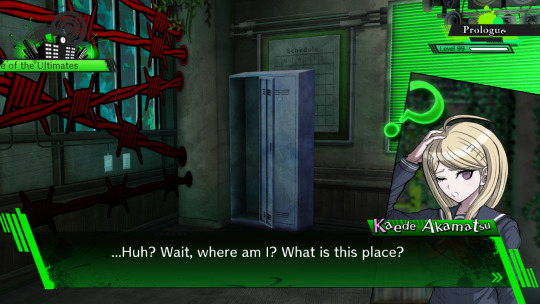
That’s what we all would like to know too.


Imagine someone goes through the trouble of kidnapping you while you are on the way to school, and brings you to... another school you’ve never been to. It almost sounds funny if you ignore the small big fact that they are brought there to kill each other.

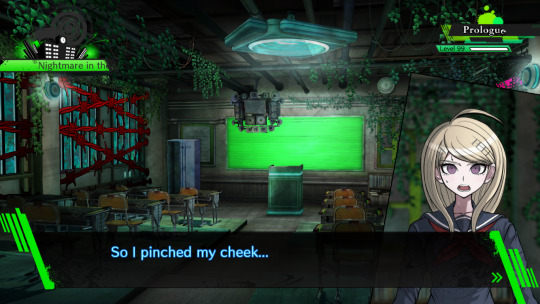
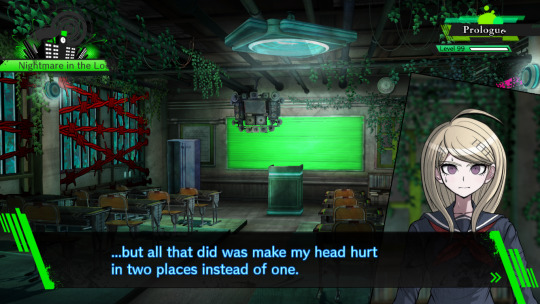
You tried, Kaede.
Also I forgot how much of the prologue was really just “Kaede causes herself physical pain while trying to calm down simulator” wow
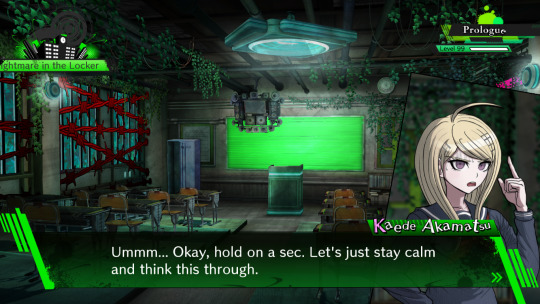
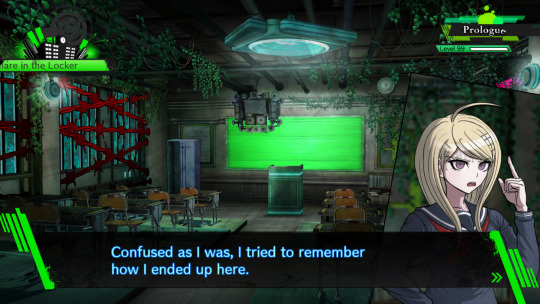


Dun dun duun

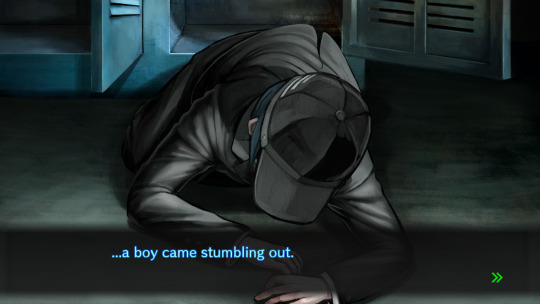
Insert “Wow, Kaede comes out of her own closet AND brings hat boy out his closet too? Doing Arceus’ work, Kaede” joke.
Also hi, Shuichi.

This is honestly a weird way to phrase it, as what Kaede says is that it is “A boy dressed in a normal school uniform...” than emphasizing on Shuichi’s own normalness, in the Japanese version.
It is also the only line that has a slight change in both takes as in the second take, she says “A boy dressed in a bit weird school uniform...” which due to copy-paste and adjective being used to describe Shuichi than his clothing in the translation, it ends up being glossed over.
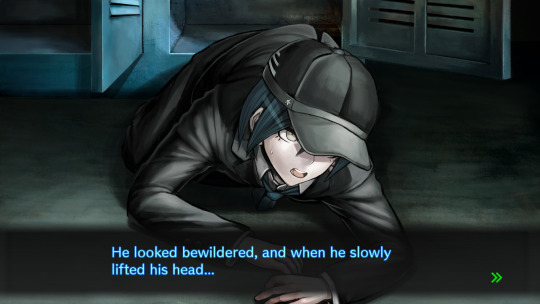

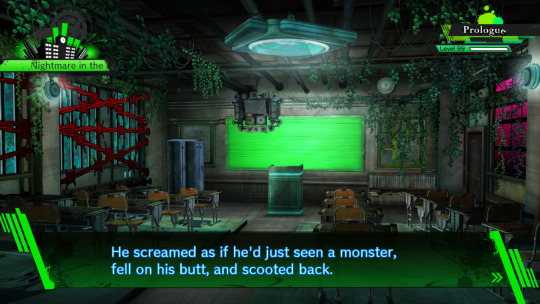
On the one hand, still funny. On the another hand, this kid is justifiably terrified...
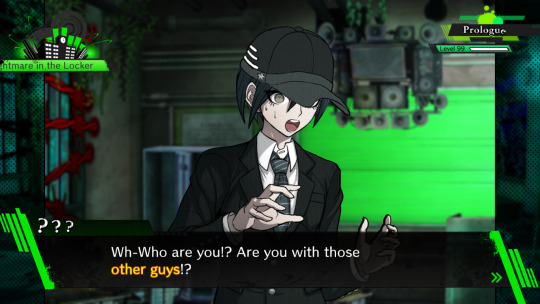
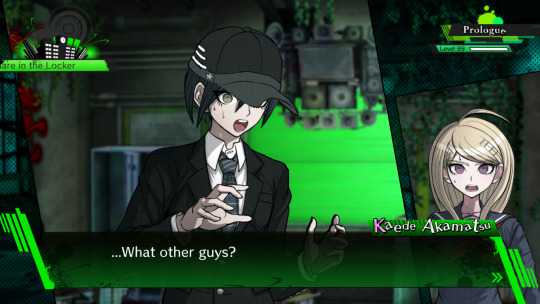
“Buddy I need some context here I have no clue what’s going on”
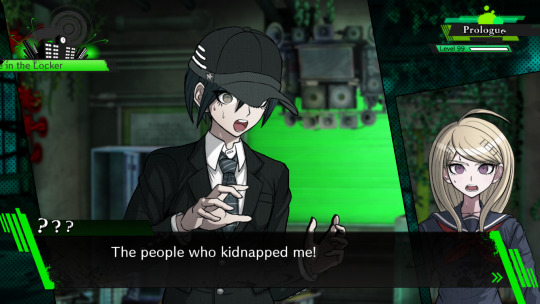

“Oh yeah that happened”

Shuichi: Sees a girl in high school uniform, kidnapped by likely people older than them himself
Shuichi:
Shuichi: You are working with them aren’t you?!
10/10 detective work there hat boy. I know he is probably just still too scared to think straight, but it is still funny on hindsight.

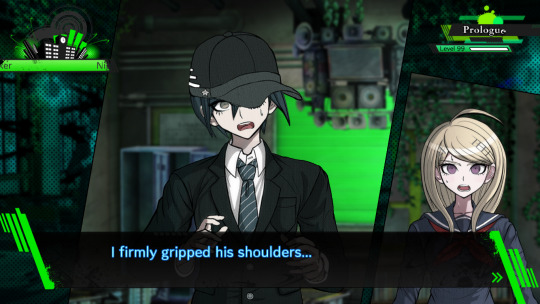
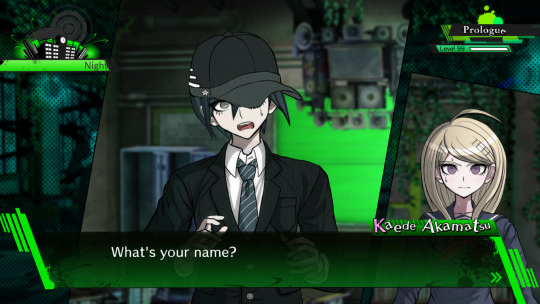

That’s one way to calm someone

And both of their names are the same both takes too. Their way of referring to themselves (私 for Kaede, 僕 for Shuichi, which are both used in the Chapter 1 title as well) are same, as well as their general speech patterns too.
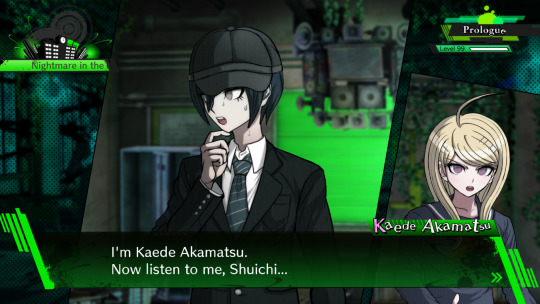
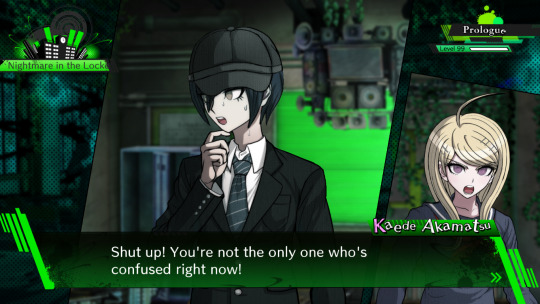
Damn, girl.
Also a nice time to point out that Shuichi spends a good chunk of prologue retake and chapter 1 doubting if they can really trust everyone, and it is good to see that he had same tendency to assume he is the only one facing something/that people around must be enemy unless he is explicitly told or shown that they are not.
It makes sense in the situation, really, especially with how Kaede being the one who opened the door to his locker, his experience is that this girl could be working for/with the ones who kidnapped him, but still worth mentioning.

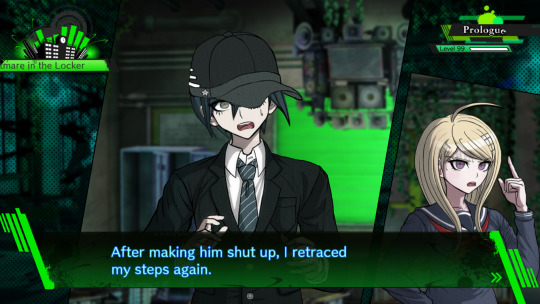
A real flashback time-
Which is coming soon, because tumblr refuses to add more pictures to this post OTL
#danganronpa#danganronpa v3#drv3#drv3 meta#drv3 translation#drv3 commentary#v3 spoilers#drv3 spoilers#prologue#welp here we go#I could trim off some of the screenshots but#it looks more coherent and follows each other better this way?#I was gonna cut it after this next part anyway#so that works#and just checked how many pictures there are and seems like first take of the prologue will take about three posts#yaaay
16 notes
·
View notes
Text
Dave Malloy’s descriptions of the Moby Dick musical
- All of the following are interview quotes and similar, relating to what the show will be like
- Clearly, not every detail of this may necessarily follow through or be 100% up to date, but I haven’t included anything when I’ve been given an impression it’s no longer relevant
- To make it a bit more readable, I’ve sorted the quotes into:
What does he want from this adaption? What does he think is important in adapting Moby Dick?
The structure of the show
Themes and focus
Other (song and character specific details)
- In summary, though:
Dave’s main goal in writing his musical is to create an adaption that he feels honours and appreciates the novel in its entirety - formal quirks, whale minutia and all - not one that just tries to extract a plot.
Currently the show has a four-part, two act structure. The first part is the most Broadway-style, and sets the narrative in place. The second part is more cabaret-style, and focuses on the whaling-related scenes. In the second act, part three is a jazz-based song cycle dedicated to Pip. Part four is a “dream ballet” section that wraps up the ending of the novel. The book of the show is still strongly based in Melville’s text, but less text-heavy than Natasha, Pierre and the Great Comet of 1812. Like Comet, it’s mostly sung-through.
Dave is very focused on using Moby Dick to reflect on modern life, especially to discuss issues of race in modern America, and how this context compares to Melville’s own (he also expresses interest in metatheatre regarding the role of Ishmael/Melville as the writer). Whiteness is highlighted as an important motif. He also states that Pip’s story of being stranded at sea has become “the heart” of his musical.
What does he want from this adaption? What does he think is important in adapting Moby Dick?
“My challenge is to adapt the novel on its own terms rather than extracting story. The novel is a very bizarre beast of a thing; it has all of these tangents and digressions, a bunch of different forms, and I wanted to embrace all of that.”
Baryshnikhov Arts Center article by Lydia Mokdessi, April 8 2016
“I’m really drawn to that, people playing with the form, and so I try translate that into musical theatre. How can I play with that form of musical theatre? That’s so much more compelling to me than just telling a story. I like telling a story and there’s an extra meta-layer of how are we telling the story.”
“There’s been so many adaptations of Moby Dick and I think they all kind of fail, because they all just tell the story. The story, there’s not much too it. This guy is crazy about a whale and he goes and hunts it down and everybody dies. What makes Moby Dick an amazing novel is actually not just the story, it’s all the playing with form, and the idea that this writer, this Ishmael (slash Herman Melville) is basically trying to encompass what all of humanity and life is, within the story of a whale.”
Interview at The Dutch Treat, June 6 2018
“Especially giant epic novels I have a real affinity for. I love that amazing sense of reading something that was written two or three hundred years ago and thinking, ‘that’s a thought I had yesterday!’ Seeing how humanity doesn’t change that much. I am looking at these classics through a very contemporary lens with the hope of rescuing them from their bad reputations.”
Baryshnikov Arts Center article by Lydia Mokdessi, April 8 2016
The Structure Of The Show
NOTE: The most recent tracklist (from The Public Theater workshop) can be found under the “extra content” link on this blog
“Originally we had imagined that Moby Dick would be […] seven hour-long theatrical pieces that could be seen in any order [...] now it is just a single evening’s entertainment that’s basically broken into four parts. The first part is kind of the traditional musical theatre narrative, getting the story underway. The second part focuses on all the whaling chapters and just on the minutia of whales. Part three is about Pip, and part four is the culmination of the narrative, and is almost like a dream ballet, in a weird way. It’s a very weird section”
“Pip’s story feels like the core of the piece”
Interview at The Dutch Treat, June 6 2018
“The first act is like a Broadway-style musical, the second act is more of a vaudevillian cabaret, and the third act is a jazz song cycle, and […] the fourth act is a movement-heavy ballet-type section. […] The idea is definitely to use the form of Moby Dick, and to tell the entire story, not just the plot, but also include those chapters on whaling, and tell those parts through different styles of music.”
American Theatre Wing’s “Working In The Theatre: Adaptation”, 2017
“I am such a huge fan of using things in the public domain [...] so there’s a fair amount of Melville’s original words in it. I think it’s definitely less than Comet. Great Comet was probably like seventy to eighty percent Tolstoy, and Moby Dick is probably more like forty to fifty percent Melville. So a lot of it is his text”
[...] “Melville is such a poetic writer. He is thinking about every single word he’s using, and so many of his sentences are so, so beautiful, not because of rhyme, but certainly he is dealing with alliteration and assonance and some of these other poetic devices. So for me, revelling in that is enough. The musical forms take their cues from the writing, from Melville.”
Interview at The Dutch Treat, June 6 2018
“My intention is to have the majority happen as song. I’m really drawn to the sung-through form; the few things that are spoken can resonate all the more. Spoken text is good for language that we want to really pop and for cumbersome exposition. Sometimes we just need people to say the lines so we can get to the song.”
Baryshnikov Arts Center article by Lydia Mokdessi, April 8 2016
Themes And Focus
“Originally we had imagined that Moby Dick would be […] seven hour-long theatrical pieces that could be seen in any order. Then what happened was one of those seven pieces became so much the heart of the show that I didn’t want anyone to see anything without it. And that was specifically a section about the very small character, Pip. He’s literally the smallest character, he’s nine years old. He’s this boy on the Pequod, and he has this experience where he gets stranded in the middle of the ocean. He gets thrown off of a whale boat during a chase, and gets stranded in the middle of the ocean for an hour or so. In that hour of just seeing nothing but the water and the sky, he goes insane. That character, reading the novel, was the most compelling character to me. So one of these seven acts was just “The Ballad Of Pip”, and it was the first piece I wrote. Then in trying to go and visualise what this thing would be with these other six pieces, I was like, well I don’t want to tell any story that doesn’t include Pip’s.”
Interview at The Dutch Treat, June 6 2018
“But then the larger thing we’re trying to do in this telling of Moby Dick is actually just talk about race in America. In this particular casting of Moby Dick, we’re casting everyone as people of color, and women of color, except for Herman Melville and Captain Ahab, who will played by white men. I think Melville was grappling with the same sort of things: what is America, and how does America deal with race? So in Moby Dick, it addresses the same thing. I think in context it’ll be clearer with [Cetology], but a lot of that song really is about race, and about how it feels to be a white person writing words for people of color to say, and what that means. And for Herman Melville to be writing the “The Whiteness Of The Whale” which is one of the huge chapters in Moby Dick that people love analysing to death, cause it’s such an amazing and beautiful chapter. Like, what was Melville thinking? What was Melville’s awareness of the racial problems of America, of this very young country that he was living in? We’re interested in dissecting all of that”
Interview at The Dutch Treat, June 6 2018
Other
“Ishmael is not really a critical part of the story of Moby Dick. He’s just the guy who was around and happened to see all this stuff. And then, weirdly, he becomes this omniscient voice who sees scenes that he’s not there for. It’s a very bizarre thing! Also, that’s one of the things that I love about theatre: the meta-theatrical element that comes with me not just as an actor playing those roles but as a writer playing those roles. I feel very much drawn to those roles that are contingent upon being the writer of the piece”
“As Melville, I’m telling this tale that I feel attached to but also feel reservations for how I’m attached to it”
Interview at The Dutch Treat, June 6 2018
“[Cetology] will be the song that opens part 2 of Moby Dick, which is the whaling section. So this song is an adaption of chapter 32 of Moby Dick which is called Cetology, which is famously the most hated chapter of Moby Dick, for people who don’t like Moby Dick, cause it’s the chapter that’s basically an encyclopedia entry about whales. Or rather, it’s Ishmael’s attempt to write an encyclopedia entry about whales, and he fails, ultimately. Thinking about this meta-theatrical element of play-writing, this song has become a piece about the task of writing a play based on Moby Dick and knowing that I will inevitably fail. So it is a song about failure.”
[...] “I think in context it’ll be clearer with [Cetology], but a lot of that song really is about race, and about how it feels to be a white person writing words for people of color to say, and what that means.”
On Ishmael’s solo, Cetology. Interview at The Dutch Treat, June 6 2018
“[…] There is a lot about whiteness woven throughout the show that will (hopefully!) make more sense in the larger context”
In response to me asking about lyrics from Cetology, on Twitter, December 24 2018
“...Cutting In, that’s like the big cutting apart the whale section, that’s gonna be like 15 minutes song-and-dance, that’ll be big. And then I’ve gotta do Sextet, which is kinda a trick cause it looks like it’s one song but really it’s six simultaneous songs that happens towards the end...”
Great Comet Instagram takeover, August 31 2017 (I take this with a grain of salt because in the same takeover he described The Sermon as 10 minutes long, which it obviously isn’t anymore).
NOTE: a diagram Dave posted on Twitter, presumably pertaining to the song Sextet, can be found on this blog. It is, however, quite old and not especially easy to make sense of.
#moby dick#mobydick#moby dick musical#dave malloy#ishmael#pip#ahab#cetology#cutting in#sextet#interview#twitter#instagram#quote#my post
55 notes
·
View notes
Note
Thoughts on icelandic sagas, norse myths, or a mythology tradition of your choice?
Oh man, here we go, thank you friend. This got super out of hand, so I only did the first two and I am so sorry this got so long.
So, Icelandic Sagas: a+ reading material and super fascinating historically! There are a bunch of categories that I won’t go into, but here’s the thing: the Icelandic sagas are simultaneously super interesting in that they’re vernacular literature (that is, Not Written in Latin, the language of the Learned Men of the Continent, which is unique and slightly more accessible to the people (though they still had to be dudes who could read, so that is very slightly but still Notable)) and yet many of them are also trying to appease the standards of continental thinking (Hello, Snorri’s desperate attempts to make native myths palatable to more Classical tastes and apparently the gods are just from Troy now). There’re lots of elements of oral poetry, especially in the earlier stuff, and it is academically VERY EXCITING. Especially because of what’s been preserved.
Also interesting is the amount of meta-commentary in some of the sagas, and not just in an adding-historical-details sense: there’s a vested interest in explaining the value, purpose, and relevance of the sagas and especially the sagas in the vernacular. BUT ALSO I am just really into the sheer breadth of material there is - fictionalized account of the settling of Iceland, recountings of myths, ALL THE CONTEMPORARY POLITICAL DRAMA, LEGAL DRAMAS, historical accounts, retellings of French and English romances! There’s a lot and it’s really neat. I have a master’s degree in the subject and could yell for hours, but will sum it up with: VERY FASCINATING FIELD, STORIES WORTH READING.
“But Sovin!” you say, “Where the fuck do I even start?”
Good question, friend, let me offer you some recs under the cut because everything is out of hand!
Völsunga saga: The saga of the Völsungs! One of my all-time favorites. The same story cycle as the Nibelungenleid, but infinitely preferable. It’s a fun mythic romp rife with heroism, disaster, impossible choices, and drama, including: The Worst Hero Test Ever, Poisons: Internal and External Applications, Dragon-Slaying and Cursed Items, Long Term Revenge Plots, Very Literal Interpretations of Blessings, and So Many Schemes Gone Horribly Wrong! Content warnings for incest, so many murdered kids, dead kid cannibalism, general murder, and some misogynistic BS. There’s an audiobook version for free, too!
Looking for something shorter? Try Hrafnkels saga Freysgoða, the tale of a real fuckin’ dick chieftain in the 10th century, featuring legal disputes + drama, revenge, indications of cultural changes, power struggles, a horse, and, of course, murder. Content warnings for murder and mutilation.
For a basic (but biased) intro to the Norse myths, give Snorri Sturluson’s Gylfaginning a try. It’s a rough introduction to the mythic cosmology in a knowledge contest frame story, with some bits of the Völuspá (the best-known of the Poetic Edda poems, a convoluted but fascinating read) for poetic flavor. Just don’t take Snorri too seriously, he has an agenda, after all. They’re myths, there’s some fucked up shit, but I think this evades anything too graphic.
There are many more sagas, of course, and I’ve left out some of the “key” (aka most popular) Icelandic sagas, mostly Brennu-Njáls saga (Burnt Njál’s saga), Egils saga Skallagrímssonar (Egil's Saga), and Grettis saga(Grettir's Saga), all of which deal with social issues in early Iceland, feuds, and dudes who just cannot fucking calm down and live within societal boundaries. They’re good, but very dense and not as reader friendly.
SO, MOVING ON, NORSE MYTHS:
Oh fucking man do I have many feelings on the subject. And the way they’re interpreted casually, yikes.
Which I kind of hate saying, because myths are supposed to be fun, and I am all for interpretations, but a lot of derived material just makes me sad.
A lot of what we have to base our understanding of Norse myth on is, well... Snorri. Snorri Sturluson, a 13th century Icelandic Commonwealth aristocrat. And there’s some really interesting stuff in the material we have, and not all of it from Snorri! But our understanding of pre-Christian Norse myth is very biased, late, and relatively spotty.
I love the myths, I really do, there’s some good fucking shit there! I wish I had a good compendium to recommend, because they’re a blast. It’s hard not to enjoy all the inventive, petty, witty myths: a lot of them involve trickery and riddles and People with Opinions. It’s really fun to sink your teeth into a story and wonder “oh shit! How is this gonna resolve?!” And, as with the rest of the Icelandic sagas above, some of the prose and literary devices will just blow you away, though translations can be a bit stilted. (Y’know what are great? Kennings. Kennings are great, and there’s an online database for them, which makes me happy.)
Uuuuuunfortunately, the myths’re very poorly understood and often miscontextualized. It’s like talking to a bunch of people who think Disney’s Hercules is a complete and accurate understanding of Greek myth. Yeah.
Like, I want people to have fun, fun is good! Marvel’s interpretation can stay the hell away from me, but it’s kind of its own thing, so I can just plug my ears and pretend it doesn’t exist. But, oof, there’s so little nuance to so many interpretations.
Myths are kind of... inherently political. The Vanir hostages (Njörðr, Freyr, and Freyja) may be earlier deities incorporated into the Æsir tradition as it developed, but they’re clearly marked as outsiders for a reason! They act like outsiders! (With the possible exception of Freyr, who’s the only one of the three to not survive Ragnarök, which, like, OH MAN AM I INTERESTED IN THIS, Y’ALL.) The jötnar (not giants in the way we’d think of them, actually) are also liminal outsider figures, which is why Loki and Skaði get such weird roles too. Myths are about liminality and about society: people get to be marked and unmarked for a reason.
If we recontextualize things, I think we need to do it intentionally. There’s a difference between recognizing and exploring why Loki and Freyja (and Freyr really should be here but I guess no one loves him?) resonate so much with queer people ((suck my dick, Respected Norse Folklore Scholar *double middle fingers*)) and projecting our social mores and restrictions onto myths without considering the implications. It’s so easy to be reductionist (Loki is a Disaster Gay/Trans Woobie and Freyja is a Delicate Helpless Flower Who Can’t Do Shit for Herself/Hot to Trot Warrior Badass who Eschews Girly Shit(?????)) and gloss over that.
Which is fine, I guess, people are having fun and it’s not like it’s hurting the pre-Christian Norse community. But then you’re pretty much playing with original characters and it’s okay to acknowledge that, instead of pretending it’s the Hottest New Take on the material. I’m not always a fan of the same displacements on Greek deities, but it feels a little different to me, given their cultural/mythic dominance and the way they’ve been used in Western society to manipulate and reinforce social norms to a greater degree? Also people generally seem to understand that there’s a... separation there from the core material that I often see missing from discussions of Norse myth.
I definitely am not going to rain on anyone’s parade, but it’s hard not to sit there looking directly into the camera when I see some of this shit.
Anyway, Norse myths are great and I think are full of fascinating suggestions as to a variety of social norms and structures, as well as the liminal and outlying cultural spaces that we can explore!
On a last note: Freyja and Oðinn are both psychopomps for the warrior dead. Oðinn’s hall is Vallhalla (Valhöll) and Freyja’s is Fólkvangr. Freyja gets first pick, motherfuckers, and I love her.
#sovin the socially awkward#answer memes#i have a norse myth problem#long post#oh god such a long post#sorry you apparently got me on a Day#but thank you so much for this!#I had a blast talking about it!#radioactivepigeons
8 notes
·
View notes
Text
180422 - 일산 (Ilsan) Fansign (6VIXX)
So I feel a couple ways about fansigns in that I want to see VIXX and talk to them in theory, but I feel a lot of pressure about saying the right thing to the members. If you just go to one fansign in your life, you can think of something really significant and then say that and be done. On the other hand, if you go to lots of fansigns, you can just chat about whatever. However, if you go to just a handful, you’re caught in the in between where you do have more than one chance to talk to them, but really how much do they actually remember you? Also, it may be my imagination, but every other fansign I’ve been to has left something lacking. The other ones are great. This time it was the great kind’s turn to have a go.
I went somewhat early to the venue because I picked up a camera from a friend on the way there. The number I picked (out of 100) was right in the middle, which personally is great to me but for pictures/view in a flat room (without staggered seats;;) is not great. Anywho, I was sitting there, and a friend of mine came over to ask me to film her while she went up. The person next to me must have heard me talking to her in Korean (mostly listening, but still) because after a while, she talked to me. She asked me (super politely and hesitantly) for a post-it, so I told her I got mine from the fan staff. It turned out to be her first fansign, so she was nervous. I told her I was nervous even though it wasn’t my first fansign. And I was. I was so nervous before going up to talk to them, but the thing is, I wasn’t nervous about being near VIXX, I was nervous because I didn’t know what to say. I think this is why I was nervous for the second 도원경 fansign too. Anywho, she and I chatted a bit here and there during the fansign and that was fun and helped my nerves.
I noticed Leo doing this...dumb thing where he was like granting people permission to approach him with a nod of his head. He was the first one in the line up and thus had such power. I guess it went to his head. One time in particular he even held his hand up so the person stopped before he decided they could approach him and nodded his head. This guy smh
Unfortunately, despite my frantically trying to jot down all that happened right when I sat down after talking to all of them, I managed to garble and forget some parts of what happened. This is my attempt at an ‘accurate’ replay of the signings.
As I have mentioned, I was rather nervous before going up to the stage, but upon actually approaching VIXX, I calmed down. Or rather, I wasn’t actually nervous. So I go up to the (unfairly gorgeous silver-haired beauty) Jung Taekwoon. I had sort of tried to think of some things to say, but I didn’t exactly get to say...anything I had wanted to really. Seriously, this guy;; I went up and he said “Hi,” so I said “hi” back. Then he said, “It’s been a while.” Which. It sort of had been? I mean, it depends what he was referring to. I saw him at his musical? And I had seen him the day before at Music Core (where he definitely didn’t see me). If he meant it had been a while since we’d been face-to-face...yeah. It had been about 6 months now that I think of it. Back to the fansign though, Leo glanced at the postcard I had written him and started chatting away. (Now I realize this may have been somewhat my fault because my first line of the letter was something about me possibly not having anything to say at the fansign. He glanced at what I had written and must have seen something about my dream because he suddenly asked what my dream was. I told him I want to be a translator and he immediately said he knows I will become one. Thanks Leo. (This Leo was such a turn around from the poor baby I saw at the LR fansign I went to. Poor sick babyㅠㅠ) He looked at the postcard I gave another time and realized there was Japanese on it. For some reason he was ridiculously surprised and said, “Japanese?!” So I told him I went to Japan. Which he then repeated. So I added that yes, I went, and I saw the hamjji that was so cute (on the postcard) that I had to buy it. He sort of ignored that comment...as he does. He also asked if I like Korea and why I do. I was reminded of the time during a 도원경 fansign when Ken asked what I like best about Korea. Upon hesitating, he offered the answer of “VIXX”, which I readily agreed was the best thing. I tried to use this answer with Leo, but I don’t know if he found it to be too jokey or what, but he was unsatisfied. He further asked if I like Korean food. (Yes.) Then asked if I liked spicy food. (Also yes.) I really feel like I’ve missed something here though because the flow of the conversation seems off...Anyway, we ended with him thanking me and 오래보자s to each other, so I won’t complain. (Except I looked at a video of me that my friend took and realized that I talked to Leo the least of all the membersㅠㅠㅠ He was leading the conversation too muchㅠㅠAgain. However, my friend reminded me that his asking me questions meant he was curious about me, so I feel better about it all haha)
Ravi was after Leo and somehow we managed to not be awkward! It is a miracle! I seriously thought that Ravi and I would be awkward with each other for all of eternity, but finally after 2.5 years of seeing him, 4 other fansigns, and semi-talking to hims once, we may have escaped Awkward Land! I think the first thing he asked me was how I have been (in English), to which I responded in Korean that I was doing well. I had already planned to talk to him about his lyrics/songs, so I told him that I like Navy & Shining Gold. I said I particularly liked the part in the song about being sorry. I also explained that I translate his songs and they are usually really hard (but this one wasn’t). He said hard at like the same time as me too though haha. (I think this was when he said sorry in English.) He said that he should make them easier, but I said no. I like that his lyrics are hard to express in another language because that means they are poetic. I feel like we might have mentioned something else here because we talked for a bit...strange. Anyway, we ended with the typical see you agains. (A side note: I kept being distracted by Ravi’s eyebrow?? The one with the scratch through it?? I kept looking at it when we talked. Even though he had a tissue sticking out of his nose as well because he had a nose bleedㅠㅠ)
Next was our Hyuk baby! I always struggle with what to say to Hyogi because...I don’t know he seems like such a mystery. This time I was prepared with a comment about his song on the album Good Day. I went up and he said hello (안녕하세요), and I replied with the same. I told him that he makes songs really well and that I quite like Good Day. I said that when I just hear the song, I feel great. To which Hyuk replied, “Oh really?” ...This kid;; I added that I like his other songs too. 안아줄게 and Milky Way. He’s really good at making exciting songs. However, this kid continued to not give me any material to work with and said, “Really? Thank you~” At this point, there was a pause where we were just looking at each other and blinking. Upon watching the video my friend shot of me, I couldn’t find this pause, but I swear there was oneㅠㅠ Silly time slowing down on me. Anyway, I figured we shouldn’t just stare at each other for eternity, but I didn’t know what to say anymore and Hyuk wasn’t helping me out either. So I literally said, “I don’t know what I should say.” Then Hyuk smoothly asked where I came from. I decided to lighten the atmosphere by saying the part of Seoul I came from, which made him laugh. (Success!) I continued by telling him I am from California. Then he just said, “California wine!” Cue me not knowing exactly what to do with that semi-statement. I asked if he likes wine, so he said yes and asked for a recommendation. Good thing I like wine too, but honestly I’m still figuring out what I like (and have a bias toward Italian wines for some reason). I thought of this almond wine I’d enjoyed before and tried to describe it. I ended with saying it was a sparkling wine, and Hyuk said, “Oh~ sparkling wine!” That was when he said thanks and we exchanged ‘see you agains.’
Ahhh, then N was nextㅠㅠㅠㅠ He is such a sweetheart and makes my heart all warm and fuzzy every fansign I go to. He seriously must steal so many hearts at fansigns. He makes you feel so special and noticed, you know? I went up to him and he said he remembers me. I wasn’t particularly surprised at this point because I have seen VIXX quite a few times, I know they’ve seen me a few times at least, and I am visually rather different than most fans. Anyway, he said he remembered me and that it had been a long time, right? On the spur of the moment I decided to ask if he knew how long it had been since I started coming to see them. He thought for a moment. Then he said, “I don’t remember exactly, but...3 years?” Although he was asking, his expression was expectant that he was pretty close. I was so...not exactly surprised but happy maybe? I told him it had been almost 3 years. I went to VIXX N Kpop sometimes back in the day. He nodded in understanding saying that that must be why he remembers my face. I told him that back then I didn’t know Korean. He seemed a bit surprised and said my Korean is good now (thanks haha). N said he hoped the radio was helpful and I made sure to say that it really was because he speaks so clearly. And then at the end he said “see you again^^”
Oh Kenneth. That kid was next. He...is always a fun one. He will probably always start in English. He said it had been a long time, so I responded in English that it had been. When he asked if I had been doing well, though, I switched to Korean to say I am doing well. I don’t recall if either of us said much else yet, but I overheard the person next to me speaking to Hongbin in Japanese. That really threw me off because my brain was suddenly like, “Japanese! You should listen to it! I don’t know what Korean isㅇㅅㅇ” I literally put my hands up to block the sound from my right side, and poor little Ken was so confused. I finally got across the point that my problem was hearing the Japanese next to me. The confusion (which he was trying to hide) immediately lifted from his face. Confusion turned to him being impressed and asking if I knew Japanese too. He was like, “You speak 3 languages? Korean, Japanese, and English?” So I told him my history of translating VIXX stuff, starting with Japanese and now mostly just doing Korean. He told me I am a genius (in English). More specifically he said, “Genius이네요!”ㅋㅋㅋ I of course denied being a genius and we said see you again before I moved on.
Last was Hongbin...with whose interaction I don’t remember very wellㅠㅠ I do know that he said my name (which I just love when he says). Then Ken leaned over (because no one was in front of him yet) and told Hongbin that I know Japanese too. Hongbin was impressed and asked how I learned Korean, so I told him. I also semi-jokingly said that VIXX helped me. (But really though.) I told him that I sort of picked up some of the members’ speech patterns because I had watched so much of their stuff, haha. I think he was somewhat amused at that (or didn’t believe me, who knows?). He also asked where I came from, so I asked if he meant now. He said originally, so I told him I was from California but now live in the area of Seoul I live in. He asked (again--see 도원경 fansign #1) how long I have liked VIXX. I said about 4 years (to keep it simple seeing as that is when I feel I became a fan rather than just liking them). He thought I said 3 years though, so I corrected him. He seemed a bit impressed at the length. I think that is all we talked about before saying our goodbyes.
After going through and getting signatures from and talking to everyone, I had to wait a while for everyone to finish. At the end, 2 people were selected to ask questions. One person asked about the order of VIXX’s names in the fanchant for My Valentine. N explained that the order was just the order that the members stand up for the choreography. (The fanchant was changed to this to match the members standing up instead of the usual age order chant.) They also shared how the members almost laughed when the fans were confused that 2 members were standing up at a time (because the music show they were on had cut the song slightly without warning the fans;;). The second question was whether they had cried when listening to a song before. They each went through and answered and they said goodbye and left. (Leo kept waving until the very end and poked his head back out after the door closed. He even opened the 2nd door, which they hadn’t gone through, to wave again. The fan manager had to point that out for us to see because everyone was already getting up to go. That precious kidㅠㅠ
(Video here.)
14 notes
·
View notes
Text
samurai skills;
After I posted my translations of the Ruby Sea and Kugane place names, someone asked me to do similar translations for samurai job skills, so... here are translations of the game’s samurai job skills.
As a disclaimer, I’m not really familiar with real-life samurai, nor am I especially good with the kind of old-timey Japanese that’s used here — this is just an attempt at explaining what some of the untranslated skill names mean, for people who don’t really know Japanese at all!
I will also do ninja job skills eventually, but I don’t have as much free time as I used to, and I think my posts are becoming fewer and farther between...
I still haven’t even finished Stormblood...
刃風
Hakaze
Taken apart, the characters mean “blade wind.” Not to be confused with the characters the other way around, which would make it “wind blade.” Blade wind.
陣風
Jinpu
Means “gale.” Or “gust,” or “blast of wind,” but I think “gale” sounds the coolest.
心眼
Third Eye
Read shingan, meaning “mind’s eye,” but “third eye” works just as well.
鳳蝶
Ageha
Ageha refers to the swallowtail butterfly, though I should add that the actual characters involved mean “phoenix butterfly.” So “swallowtail” or “phoenix” would therefore both be accurate, but I might personally go with “swallowtail” because I think that has more of a nature connotation, as far as the English language goes... but hey, you do you.
燕飛
Enpi
Means “swallow,” like the bird, or perhaps more accurately, “flying swallow.”
士風
Shifu
Uh, this is hard... Taken apart, the characters literally mean “warrior wind,” but 士 sometimes refers specifically to samurai, and so I think this actually means “samurai style.” By that, I mean “in the style of samurai,” or like... thinking and behaving the way a samurai should... Don’t quote me on that, please.
風雅
Fuga
Means “elegance.” I don’t know if it has additional connotations, but I assume so.
月光
Gekko
Means “moonlight.”
居合術
Iaijutsu
Iaijutsu is, essentially, the art of quick-drawing a katana as a means of counterattack. If you really don’t know anything about it, you can probably watch some demonstrations on YouTube or something.
満月
Mangetsu
Means “full moon.”
花車
Kasha
Given the context, I think this one is best translated as “fragility,” though the characters themselves mean (roughly) “flower wheel”...
桜花
Oka
Means “cherry blossoms.” This probably looks a little more familiar to manga and anime fans when I spell it ouka — I feel like it’s a common name for female characters.
雪風
Yukikaze
At its most literal, this means “snow-bearing wind,” but more poetic variants like “blizzard” or “snowstorm” are perfectly acceptable.
明鏡止水
Meikyo Shisui
The characters mean “shining mirror, still water,” but it’s actually a phrase that refers to the state of being calm and serene. Clean as a polished mirror, tranquil as still water — essentially, “having a mind undisturbed by evil thoughts.”
必殺剣・回天
Hissatsu: Kaiten
I generally see hissatsu translated as things like “killing technique” or “deathblow” or “certain death.” Kaiten means “revolution,” in the sense of “changing the world” or “turning the tide” or “turning the tables,” though since the character ten (heaven) is involved in all three hissatsu, “turning the heavens” is probably the best way to translate kaiten. As far as having a single English phrase for this, Deathblow: Revolution is probably what I’d go with.
必殺剣・暁天
Hissatsu: Gyoten
Gyouten means “dawn,” or “sunrise,” or “first light,” but again, as far as cool English skill names go... how about Deathblow: Daybreak?
必殺剣・夜天
Hissatsu: Yaten
Yaten means “night sky,” but again, we’re shooting for Rule of Cool here. I like Deathblow: Nightfall, personally.
慈眼
Merciful Eyes
Read jigen, generally referring to the merciful eye of Buddha watching over humanity. A lot of these terms have similar cultural implications, but I’m not sophisticated enough to know them.
黙想
Meditate
Read mokusou. Yeah, it means “meditation.”
必殺剣・震天
Hissatsu: Shinten
YEAAAAAH WE’RE BACK TO THE HISSATSUS
Shinten means “earth-shaking” or “tremor” or — keeping ten in mind — “to shake heaven and earth.” I guess I’d suggest Deathblow: Earthquake, but I’m open to suggestions on this one, ‘cuz I don’t like that so much...
必殺剣・九天
Hissatsu: Kyuten
Kyuuten means “nine heavens,” which is a concept that stems from ancient Chinese cosmology — the middle sky and the heavens of the eight directions. Think of it as the celestial sphere, basically. Let’s just call this one, hmm... does Deathblow: Firmament sound good to you? Actually, wait, if we call this one Deathblow: Firmament, maybe we can call the earthquake skill Deathblow: Foundation...
必殺剣・星眼
Hissatsu: Seigan
Mmm, this one’s hard... some digging led me to believe that seigan refers to the act of raising the point of your sword towards your opponent’s eyes (thus locking eyes with your target). Understandably, however, we don’t really have a word for that, and the characters that the FFXIV team chose to write seigan with are rather atypical, so maybe I’ll just go loose with my interpretation of the characters chosen and call this Deathblow: Stargazer...
葉隠
Hagakure
Means “hiding in the leaves,” “in the shadow of the leaves,” or else “hidden leaves.” It probably refers to the book associated with Yamamoto Tsunetomo, whose life philosophy I’ll just rip off of Wikipedia:
[He] believed that becoming one with death in one's thoughts, even in life, was the highest attainment of purity and focus. He felt that a resolution to die gives rise to a higher state of life, infused with beauty and grace beyond the reach of those concerned with self-preservation.
Hagakure is sometimes said to assert that bushido is really the "Way of Dying" or living as though one was already dead, and that a samurai must be willing to die at any moment in order to be true to his lord. His saying "the way of the warrior is death" was a summation of the willingness to sacrifice that bushido codified.
必殺剣・紅蓮
Hissatsu: Guren
Guren means “crimson,” though it is also used in the Japanese Stormblood title, 紅蓮のリベレーター (the Crimson Liberator). But Deathblow: Stormblood sounds, hmm... I don’t know, what do you think? Good, or a weird place for a title drop?
彼岸花
Higanbana
Another word for lycoris radiata, or red spider lilies — some very beautiful but poisonous lilies that are commonly associated with death. If you’ve never seen one, seriously, Google it now. Why the icon for this skill isn’t an actual red spider lily is beyond me.
天下五剣
Tenka Goken
Meaning “five swords under heaven,” this refers to a group of five katana thought to be the five greatest swords in Japan. Mikazuki Munechika of Touken Ranbu fame is one such sword.
乱れ雪月花
Midare Setsugekka
...I cannot think of a single phrase that would encompass the whole of this. Midare Setsugekka is a recurring technique in many JRPGs, like in Final Fantasy and in the Romancing SaGa series. Midare means “disorder,” or “to fall into chaos,” whereas setsugekka is a poetic turn of phrase used to describe the beauty of the changing seasons — the winter snow, the autumn moon, and the flowers of spring. In the case of the technique, as it appears in various games, it tends to be a triple-slash attack that encompasses the snow, the moon, and flowers respectively, but I don’t care about that so much as just that it’s a very pretty turn of phrase. I’ve seen this translated as Chaotic Flowerfall, but I don’t like that one bit. Chaos of the Four Seasons might also work, but it’s a little lengthy, isn’t it? Still, I don’t think it would really be possible to encompass the whole of this phrase in just one or two English words. If it were up to me, though, I’d probably just name this skill Solstice. No reason, it just sounds cool.
32 notes
·
View notes
Note
Is there anything you can tell me about Mando colour symbolism that isn't already on that "armour colour" post? I'm planning out a Sabine POV story where it would be relevant.
Well, yes and no. I went over the “facts” of colors and mandalorian color theory. What I can do now is kind of dig deeper into the actual mando’a words for colors, and maybe extrapolate more on the etymology of each word as they’re relevant to colors. If anything, it’ll give you an idea of how to break down the colors and maybe play with the meanings, or even the construction of the words themselves. Hopefully that helps?
I got a little carried away (again?) so I apologize for the length and time it took to put this together … and also you can take everything I say with a grain of salt as I’m trying to make sense of the etymology of these words. I’m also skipping orange as there’s no word for in the dictionary as of yet, and including violet since it is.
So, let’s go in the order that I went in the original post. Forewarning that black is going to be the longest section as I’ve thought about it maybe way too much.
ne’tra — black
Ne’ is traditionally one of the negative prefixes of mando’a. It’s meant to indicate the opposite of what it’s attached to, or the not-thing. Tra means space, void … but it also translates to starfield, or field of stars.
So. Black. Justice. Not the void of space, or, alternatively, Without stars, a starless night.
However way you want to interpret that is up to you, but to me? From what I understand of mandalorian history? They were once a truly nomadic people, who voyaged across the stars. They were, arguably, wayfinders. More than just warriors, or conquerors, or however most would like to put it.
I originally wasn’t going to do this, but because you mentioned (elsewhere) that you’re focusing on dusk, I want to take a moment to extrapolate on this thought. The reason I say this is because of how they view stars.
Mandalorians are generally not considered to be religious. But the language they speak is still very deeply steeped in poetic concepts — grasping at the enormous and unthinkable with words as clever and broad as a people can attempt to embody them. Stars is my personal favorite.
Ka’ra — stars, ruling council of fallen leaders. Mandalorians still speak of those who pass as not being dead, but marching far far away. The origin of the word stars is the belief that the Mand’alore ascend to the stars, to watch over the people and to guide them.
The word for breath is kar’am. Hyperdrive is karbakar (star to star). Kar’ta is heart. Kar’taylir is awareness, knowledge, lit. to hold in the heart. Karyai is the main communal living room of a communal home, where a family convenes to spend time together — and often the last bastion against an invasion.
Jate’kara, luck, destiny, literally good stars, a course to steer by.
All of these words stem from stars.
Black, the color, is literally a starless night. But, while the impulse is to go for something negative, I would actually pull away from that. Mandalorians, in general, also view adversity (something difficult, something terrible, something terrifying) as something to challenge and overcome as a way of life. A starless night is not to be feared but to be met.
A starless night may also be indicative, poetically, of a place or a people or an event without justice. And that void, that emptiness, that lack? Must be filled. Whomsoever wears black has taken it upon themselves to fill a void and reinstate justice in whatever manner that may mean.
But also consider: a night without stars evokes a specific sort of image and feeling … which may also be completely different depending on the person in question. Someone who lives in a bright city and experiences light pollution would be used to a night without stars, versus someone living out in the wild (like Krownest) or who is dependent on the stars to travel, would be used to a night full of stars and may find it distressing or strange.
ve’vut — gold
This one is a little less straightforward. Vut, or vutyc, indicates special. Unique, precious. Ve’ (pronounced vay or veh) is unclear as to what it’s meant to indicate, but often when we see ve’ as a prefix, it’s usually from ven (future tense), but in this case it may be from vheh, earth, soil, dirt.
Gold. Vengeance. A precious future, or, precious metal.
Maybe evocative of the sun rising after a long and difficult night. The gold of the sun rising is a promise of a future — or at the very least, the feeling of surviving to tomorrow. This might be too poetic though lmao, and tbh … I really like the simplicity and the directness of precious metal (lit. special dirt, lmao).
The funny thing here is that though I have gold and yellow listed together for meaning (as they are, generally, considered under the same banner of Vengeance), the word for yellow is different.
shi'yayc — yellow
So. I’m not really a fan of this word, to be perfectly honest with you. I’m of the opinion this is less an actual color and more an adjective meant to describe something else. But regardless, here it is.
From shi, just/only, and yayc, which may be from oyayc, meaning alive (or oya! which carries many meanings and generally overwhelmingly positive). Generally though, with the yc added to the end, it’s less a noun and more an adjective, so it might actually be meant to be a descriptor (ie. yellowing of skin or eyes etc).
Yellow. Vengeance. Only just alive, or barely dead.
Maybe comparison to, say, a recently deceased person — but that only really works if one assumed that all dead persons are pale and turn yellow when they die, and that’s a weird assumption to make in the context of mandalorians.
Also consider: yellow is dull compared to the shine of a metallic gold. Less intense in that way. My question is what becomes of a person after they’ve enacted vengeance? What becomes of a life devoid of a perpetual motivating force like that? What happens when gold loses its sheen and fades, dulls?
Am I just taking this too far, to the next level it doesn’t need to go? maybe
EDIT:: w/ points from anon through a later ask, I’d like to also add what they said:
you pondered about the connotations of yellow regarding ‘just/barely alive’ and its comparison to gold. I thought maybe it’s about flames/light - like a bright vivid flame is a bright gold, while the flame, when it’s only small and ->barely alive
I hadn’t even consider that it might have been referencing intensity of light/fire? But the way you put it, that may actually make more sense than the direction I was going in. I was definitely perplexed somewhat, like I was missing something. This sounds like what I was missing.
That could also apply for the heat of a flame, too. Like, referring to the intensity of the light, or the intensity of the heat, or both, depending entirely on context, and related to the below.
Lust for life
So, there’s no word for orange in mando’a at this time.
Consider: Yellow is sometimes indicated to also mean lust for life, depending on who you ask and what source material you’re comparing it to.
It’s entirely possible that mandalorians don’t have a way to differentiate between yellow and orange. Some cultures do display a limitation in language, seeing what we would consider a range (yellow to orange) as all one spectrum under the same banner.
So while Yellow may mean barely alive/barely dead, yellow may also mean nothing but life.
Something to think about.
genet — gray
Gray/Silver. Mourning lost love.
Ge’ for almost, by proximity (literally or metaphorically). Net, we can assume, comes from the word for black, ne’tra. So, in this case, gray is literally almost black, but not quite. Reaching towards it, maybe, but not quite there.
I’ve used overcast before to describe gray, or the feeling of a loss, of grief, and it still applies here. Almost, not quite, as a starless night sky. Duller, paler, than a starfield. That kind of thing—perpetually in comparison to black.
Also consider that it may infer obscuring the target, instead of almost reaching black, it may act like a filter, a translucent overlay to take away or obscure intensity of (in this case from black, or night sky). Mandalorians, who are (or once was) so used to navigating by/the stars, suddenly having to deal with their guidance obscured? There’s loss, there, too.
kebiin — blue
This one’s a little … less straightforward. Ke’ is used as an imperative prefix, usually to indicate that this word/sentence is a command, but keb may also come from kebbur, meaning to try or make an attempt. Biin, or bii, may come from abiik, air (interestingly, kebii’tra indicates sky, so it’s literally blue starfield, blue space).
What is reliable? What is faithful? Following through, or making the attempt again and again—someone consistent, trustworthy. To stretch the meaning, as trustworthy as the air.
Blue. Reliability. Faithful. As consistent, or trustworthy, as the air.
I wonder if that was ever a phrase in use. “As trustworthy as the air” might ring true on a planet where they can breathe without their helmets … but what if they so happen to land on a planet that they cannot?
In hindsight, that sounds like a very mando joke to make. B’)
“Who ever is reliable all the time?” Both a joke and a very serious question.
ge’tal — red
Ge shows up again. Almost. Tal, blood. Almost blood, or nearly / like blood.
From what I understand, the Taung did bleed red, and since they were the original mandalorians, it makes sense for them to make the simplest association for the color.
Red. Honoring a parent.
This is kind of a call back, imo, to the saying “the blood of the covenant is thicker than the water of the womb,” as chosen family ties are stronger than that of biological ones, and consider that mandalorians are expected to shed blood for their chosen family if it ever came to it.
But also consider pointing at a rose and, quite literally, calling it like blood.
vorpan — green
Vor, figuratively, is to thank. Literally, it’s to accept. Pan… is a little difficult to discover what it might indicate, or where it may come from, but from the two other words it’s a part of (epan, for guts, entrails, and sapan for electromagnet) we can kind of infer that it’s meant to indicate core, or insides, the interior of a thing.
Metaphorically, vorpan can be understood to be accepting a task to fulfill with one’s whole being. For context, vorpan’oy is the word for vegetation, as in bringing life to green.
Green. Duty. To embody one’s accepted task.
Not really sure why, but let’s go with that.
saviin — violet
This word is actually very close to Sabine’s name — they’re pronounced the same, just with a v instead of b. In some dialects or accent, one might say they are the same. I would argue they are.
So. Violet. Saviin. Sa’ most likely comes from sarad, meaning flower, bloom. Viin is from viinir, for run.
Running flower. Wild violets are considered weeds in some places, and so instead of run as in flee, run may lean more towards running wild, an overgrowth — or a plant that can live, even thrive, anywhere, in spite of adversity and outside forces attempting to eradicate them.
Survival in adversity.
And, maybe unintentionally maybe not, given the above I would argue it’s a perfect name for Sabine under the circumstances.
EDIT:: referring again to points brought up by anon in a later ask:
saviin sounds a lot like Sabine, which seems very very likely to me, considering the long i (or rather e - from an anglophone perspective) and that [v] and [b] are very similar sounds, so maybe Sabine is like a basic transcription or a dialect form of Saviin. Regarding the meaning of the colour/name
My etymology for it would be the following: “viin”/“bine” being a degenerated/shortened form (or even the root?) of kebiin - blue connected with “sa” - as, like, it gives “sa viin” - “like blue”, what is kind of a good description for purple/violet, implying the standard shade in mandalorian perception would be a darker bluish purple ALSO implying that the concept of purple cam up comparably late in the language, similar of the color orange getting it’s name rather late in germanic languages
I was going color by color so I missed the connection in the effort to complete the post, which was an oversight by me sadly.
It might also then directly connect the connotations of blue (reliability) with purple (adaptability, survival in adversity). They who are reliable can be depended on to adapt and survive adversity, or so on, kind of like orange (lust for life) from yellow, as thought about from above (the intensity of the flame).
Definitely some interesting things to think about.
#mando'a#mandoa#mandalorians#mandalorian#pomrania#izzy talks mando'a#so I have no idea if this is helpful but I hope it is at least somewhat interesting#long post for ts#c: Sabine Wren#hopefully doesn't show up in the search bc this is a ... super long post#and Sabine is all the way at the bottom#but I still want to be able to find this later#izzy talks mandalorians#mandalorians and color#meta#meta: mandalorians#edited thanks to some points brought up by an anon#edits notated
1K notes
·
View notes
Text
💖(1) Hi, could I get a matchup with a 1p & 2p guy please? I'm very interested in music & have been my whole life. I was in piano for five years before quitting to sing, & I also did a bit of drumming. Singing/songwriting is all I want to do though. I love writing pop/rock music, & singing them as well. I like to think I'm a fantastic singer & have had a lot of people tell me so. I love hardcore hip hop too even though I cannot write it or rap. I just like listening to it. Along with singing, 💖(2), I love acting. I've been in a couple plays & played the Evil Queen in a Snow White play. The same theater is doing Mulan soon so I'm shooting for the main role in that one! (I tend to like to play villains more cuz I have the booming voice & non-princess appearance). But music is what I want to spend my life doing. Another interest of mine is languages, ESPECIALLY Asian languages. Currently, I'm learning German (plan to become fluent), Austrian dialect, Dutch, Japanese, Chinese, & Korean. 💖(3). Even if I don't become fluent in anything besides German, I want to try. Some sort of translator is a backup career I have in mind. Other interests of mine include horror films/horror in general (even though I'm highkey a pussy), social networking, I play a bit of tennis, & photography. For personality, I'm very shy & can be cold upon first meeting. If it's a bad day, I might be downright rude. But even though I do have my cruel side, I really am very sweet and welcoming to people who are 💖(4) people who are nice to me. I have an witty, offensive, & sarcastic sense of humor. I enjoy roasting as a joke & don't mind being roasted back. I'm overall very confident with my appearance, weight, height (I'm super light & short), & personality, but I do have insecurities as we all do. I sometimes get the feeling my friends get sick of me & isolate myself for a bit before the mood passes. I get defensive easily if someone hints at being rude to me, but I'm also very overprotective. I cann 💖(5) ot stand drama or feels, so I tend to stay away from it. But if it involves my friends, I'm all up for a fight. (Verbally...I can't physically defend myself for shit) But AWAY FROM THE NEGATIVES, I try to be a positive person but fail sometimes. I'm very poetic, thanks to all the songwriting I do, & am actually very romantic & good at being smooth. Other stuff: I like all types of music, really. I'll listen to anything: pop, rock, rap, classical, Chinese traditional, KPOP OOHH I LOVE MY KP
(I’m sorry, I couldn’t think of a second choice for 1p. This has been sitting in drafts for so long waiting for me to think of a second that I decided to just ... Go ahead and post with just the one.)
For the First Player set of people, I think you’d be compatible with Prussia. Gilbert would adore teaching you German, and hearing you speak in any of the languages you’ve got. He loves hearing you speak (and sing) and loves seeing how passionate you are on state. He’ll be your biggest fan if you let him. He’ll be the guy that’s in the very back of the audience cheering the loudest. He’s willing to help you introduce yourself to people, even if most of the time it’s as “The Awesome Gilbert’s Awesome Girlfriend. WORSHIP HER LIKE YOU SHOULD.” He does that too much. You might need to curb his enthusiasm. He’ll be your punches if it comes to blows for you defending your friends. He’ll shield you and fight for you. And when it comes to music, you two have practically the same taste, so really, that’s not a problem. You two will show each other new songs and bands.
First of all with the seconds, there’s Canada. Matt probably doesn’t seem like he’d go for a girl like you, but it was all in the personality and how you presented yourself. You somehow managed to get him to not only see you, but to fall hard. It hurt. How dare you. The thing that really caught him was you getting into an argument for one of your friends. He hadn’t even really been paying attention to it, but something about that spunk coming from a thing that had been shy literally two seconds ago both amazed him, and made him internally swoon that something so cute could be like that. Oh yeah, he finds you pretty damn cute. He tries to be supportive of your languages and everything else you do, but some of it is hard. Especially if you start speaking those languages around the house and he just doesn’t understand. But he’s still doing the best he can, and just like Gilbert, he’ll be the one that actually fights if something comes to blows. He’s not letting anyone hurt his girlfriend. Not now, not ever.
Though, if he’s not your speed, there’s also China. Don’t think so? Stick with me. Zao is a laid back yin to your yang. He’ll be the lazy tutor of Chinese while Gilbert was the active tutor of German. He’ll probably mix up if you’re learning Mandarin or Cantonese and teach you some phrases from both. Hey, you’ve gotta learn both if you’re gonna live with him. He’ll adore your taste in music, whether he’s essentially high or not. You’ll get to hear him singing along to the Chinese traditional a lot, and he’ll adore if you play it around him. He’ll even show you some that you don’t know. He’s just happy that you’re interested. He can’t really believe he got someone so active as you, but even so, he ado r e s you. Honestly, he’s more likely than Canada. Zao will adore you and pretty much be a laid back version of Gilbert.
1 note
·
View note
Text
We saw a live concert performance of Jeff Wayne’s Musical Version of the War of the Worlds yesterday. I’m a fan of the original concept album; Shadey introduced me to it shortly after we got together, and it was my first proper exposure to the War of the Worlds story, since I’d never read it or seen any other adaptation, only heard about it. As a presentation of a story it’s a bit fragmented (don’t know if that’s just the source material or not), but the music is so good and each fragment is great - the atmosphere, the voice actors, the narration. (Well, Forever Autumn is mostly just fairly generic love song; I could do without that in this story about an alien invasion. The entire rest, though, damn.) I already knew the twist, but the buildup to it was so good that actually hearing it gave me goosebumps. What I’m saying is, you should totally click that Spotify link and give it a listen. (Discs one and two, anyway; the rest is a remix collection and a bunch of outtakes, which are interesting but not part of the actual thing.)
Anyway, when I say live concert performance, I mean they had actors in costume playing the significant parts, except the narrator, played by the main character of Ófærð because Iceland is tiny, whose giant floating prerecorded head was superimposed on an endearingly low-budget CGI video that played continuously throughout the show (presumably made for some of the official tours).
It involved a lot of the same people as that Jesus Christ Superstar production that I saw twice: same director (who also played Beth), Jesus was Parson Nathaniel, and Judas was the Artilleryman (they were both excellent). Unlike that, though, this was actually an Icelandic translation of the whole thing. I quite liked the translation; they were actual good well-written Icelandic lyrics with proper Icelandic poetic alliteration and stress and word order, not just a kludgy attempt to fit a direct translation into something vaguely close to the right number of syllables, but still without any glaring instances of “Whoa, that’s not what the original is saying at all.” (What I could make out of the lyrics, anyway - yet again, the instrumentals sometimes drowned out the vocals a bit. Many of the lines I could only make out because they were repeated like six or eight times, and I managed to figure it out on literally the last repetition.) The narrator’s lines sometimes seemed to be a bit expanded, like they included more detail than the original - without knowing anything about it, I speculated they might be lines taken directly from a translation of the book (with the English lines either having been cut down a little from the original, or the Icelandic translation of the book being from the time when Icelandic translators loved to just randomly and liberally embellish the text when they felt like it - yes, that was a thing).
It was interesting to notice, in the translation, the difference between the languages - there’s more of a gap between conversational and poetic Icelandic than there is in English, so the narrator’s use of words was noticeably more complex and literate than in the original, even though ultimately the tone came out pretty similar.
One sort of funky thing about it, though: it changed everybody’s names, and not necessarily just into Icelandicized versions either? As far as I could hear, Ogilvy the astronomer was renamed to “O’Brien”, which is no more Icelandic. Maybe it just fit better into the lyrics or something?
Anyway, it was good and I am now fantasizing about them doing JCS again but in Icelandic. This totally reminded me how good Jesus is at acting out distress. Both Jesus and Judas are just better singing in Icelandic - more convincing and no weird lyrical flubs. There exist at least two different translations of JCS; you can totally do one of those. Right? Right??
#jeff wayne's musical version of the war of the worlds#the war of the worlds#icelandic#translation#jesus christ superstar#music#ramble#review
1 note
·
View note
Text
Week 1 AKA feeling like a first year again

This right here is Ķemeri bog and its the literal Dead Marshes from LotR and this is where I want to be buried.

The world is super small and all the trams and trolleys in Rīga are made in Czech republic.
Coincidence? I don’t think so.
First days of school were real fun.
Until Sunday evening we didn’t really have the timetables, bcs link they gave us in the materials led to a page that hadn’t been updated since spring. Google disappointed us. Someone must’ve bribed some university officials and in the end we got to the page. I thought that was the biggest problem to overcome.
Every single class began with a new wave of panic when the teachers started speaking Latvian. Don’t worry, your Korean teacher will talk to you in Korean only. I can’t speak Korean. Even the hardcore k-pop fans and dorama lovers can say only a couple of words or sentences. The teacher hands our books. They are in Latvian. But don’t worry, Erasmus, you’re not gonna use them, it’s just a present, bcs the professor is so happy to have it printed finally. The book has been lying on my table since then, constant reminder of language barrier. I don’t know if it motivates me more to learn Latvian so that I can study Korean through it, or if it’s the other way around.
But having Korean textbook is one thing, but Latvian textbook in Latvian is a whole new level. There’s nothing to save you, no rope to hold onto.
It’s not a nightmare I had, it’s reality. Our textbook is all in Latvian.
Japanese lessons are cancelled, the teacher is not in Latvia yet, my classmates tell me. Does it mean we don’t have a teacher? How does this university work?
Haijima-sensei is a Latvian lady that teaches Japanese art history. She agrees to do it in English. Victory. I soon find out that she doesn’t really teach, she just plays documentaries on different topics and translates them.
It’s still better than the big nothing on Japanese art that we have in Olomouc.
On the opposite side of the street from Faculty of Humanities is a Yolo Cafe and it’s the best joke ever.
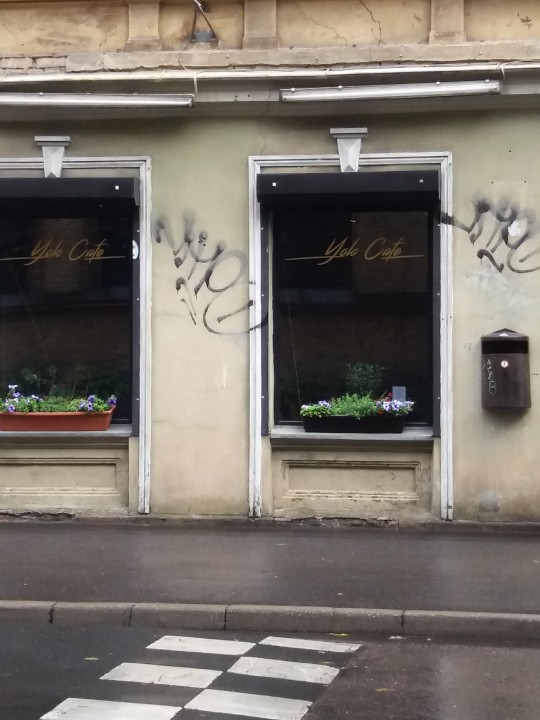
I explore the library that is in the building and fall in love instantly. It’s small and cozy and there’s shitton of books on Japan.
I also found Czech books. This is all of them. Half of them is Kundera. There’s Latvian translation of Švejk, Seifert and Viewegh. I am tempted to ask the librarians if anyone actually reads them and if it would make them happy if I brought them some books from home after Christmas.
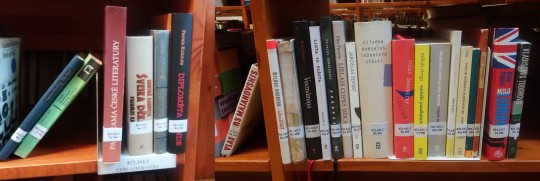
This picture right here might look like a scene from S.T.A.L.K.E.R., but it’s actually the view from our dormitory kitchen. There’s also trains with writings in Russian passing behind this abandoned building now and then and it adds to the atmosphere. I love it.
About the kitchens. They are the meeting place. This is where you start relationships, bcs it’s so easy to start talking when the opening lines are so easy and obvious - Whatcha cookin’? If you are lucky, you get free food samples. I play a game when I’m trying to guess from where people are by the looks of the food they’re cooking.

I found my people.
Unicon Cafe is a geek bar not far from the center of Rīga and they have about everything your heart might desire. Small TARDIS for the tips, big one in the corner for proper time-travel selfies, posters, flags, board games and Bill Cypher in the window. And also several-pages-long list of drinks named after everything, starting with the Hogwarts houses, through legendary Pokémons, all the way to houses from Game of thrones. And those were very popular my first night there, since it was a Game of Thrones party.
People who own the bar also do summer and winter cons and shitton of various events over the rest of the year. Kudos for active community ♥
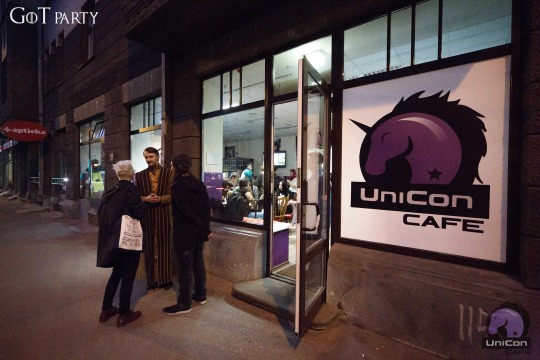
As the week proceeded to it’s end, it was gaining on intensity.
Friday seemed to have not 24, but at least 48 hours.
It started with being almost killed by a Latvian wasp. Then the universe balanced itself when another teacher of Korean(bcs they can’t have just one at the uni) told me that she wants to talk to the class in Latvian and that I can go home. Since it was 8.30am I was more than happy to oblige.
M. and A. + P., her new Hungarian roommate, were planning to go to Ķemeri (it’s pronounced Ťemeri, ok, Latvian has to be special and I’m crying in phonetic transcription) bog trail not long after I made it to the dorms. My forearm was swelled af, but the weather was nice(and that’s something you start to really appreciate when you are in Latvia) and coincidences don’t exist, so I took Zodac and decided to pack a lunch and go with them.
I was not disappointed.
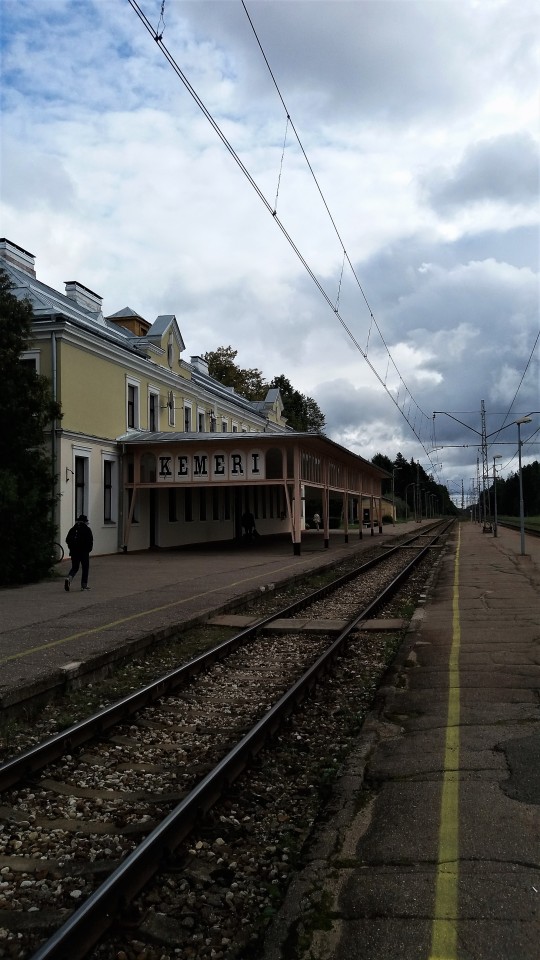
We have the opportunity to taste what travelling with Latvian railways is like. It’s bumpy, but else, pretty ok.
Ķemeri used to be pretty popular spa town, or something like that, but now it’s basically just the train station that brings ppl that go to the national park that’s close to the city. When we were waiting for our train back, we found one small shop that was probably the only one in the whole town, by the number of people that came there in the time we were enjoying ice cream outside.
The way to the bog is supposed to take 20 minutes, but it’s almost an hour and we have to cross a highway at one point.
I’m not complaining though, bcs at least half of the way leads next to an old cemetery that is part of the forest.
The others are getting skeptical, but I have Pokémon GO on and if there’s a pokéstop in the distance, it has to mean there’s something resembling civilization nearby.

We find a field that is a giant parking lot and there’s even a man selling parking tickets. There are two or three cars parked. Either it’s the best job ever, sitting in the middle of field in a forest and doing nothing for the most of the day, or the tourist season is over.
Further into the forest we pass a blue caravan. There’s a lady selling coffee, beer, chips and ice cream. It’s very surreal.
The bog is pure magic.
It’s quiet, more quiet than should be possible. There a pair of ravens flying over it and the sounds they make carries into the distance.
I think about the Dead Marshes in Lords of the Rings. (Later I found out that the Ķemeri bog was indeed a dead bog and that there should be several thousand soldiers’ bodies decaying somewhere around that area)
On one of the tables with info about the bog there was a part about safety etc. It said that swimming in the small lakes in the national park is not recommended. Not forbidden, just not recommended. So if you wanna go and die a poetic death in the bog, feel free to do that, you’re not gonna be breaking any laws *wink wink*

When we were on top of an observation platform in the middle of the trail it hit us just how flat this country is.
Politbyro took all the mountains.

But that was not the end, in the evening I found my own Rīga’s Plán B(R.I.P.) called DEPO, made some new friends and listened to some pretty cool music.
And learned an important lesson.
Even though Rīga is the capital and even though there’s shitton of public transport during the day, there’s only one single tram going from the city center in the direction of our dorms at 0.40am and if you miss that, it’s either party till the morning, or a taxi.
The fun thing is that finding the tram that you’re supposed to take is sort of a Russian roulette here. See, the night trams don’t have numbers here, even though Google maps say they do. There’s just the name of the depo to which they are going on the front window of the tram.
It’s not something pleasant to find out in the middle of the night.
But I managed to survive.
Meme of the week:
Politbyro tried to kill me and they almost succeeded

0 notes
Link
IF YOU NEED to ask who Konstantin Batyushkov is, this is the book for you. For fans of Russian poetry, and especially for Russophone poets, Batyushkov (1787–1855) is a vital figure who wrote exquisite verse and helped to usher in what is known as the Golden Age of Russian poetry. Admired by contemporaries, he is read and cited by later poets as well. Peter France, framer of this book, notes that Batyushkov is too often mentioned or discussed merely as a precursor of the best-known Golden Age poet, Aleksandr Pushkin (1799–1837); Pushkin is a relatively minor presence in this narrative, though often “name-checked” to provide context. This selection-cum-biography of Batyushkov is part of the Russian Library now emerging from Columbia University Press, underlining the commitment of that series to making Russian classics available in English. The cover describes Peter France as presenter and translator, which understates what he has done: besides introducing the volume, he is the author of a substantial artistic and intellectual biography of the poet that provides a large selection of Batyushkov’s own writings in France’s translation. The verse is set apart graphically, making it easy to flip through the book following the poetry — ideally after reading the whole thing through.
Batyushkov was a translator of note, as Writings from the Golden Age of Russian Poetry often reminds us. The attention to Batyushkov’s poetic sources suggests interesting ways to compare his translations or adaptations with the originals in Greek or Latin, English, French, or Italian. Of course, it also means looking at a translation of a translation, something of a mise en abîme. It is refreshing that France’s book makes the role of translation explicit (while sometimes offering the original, as with a late stanza or two from Byron’s Don Juan). The approach is valuable for poetry of the early 19th century, and especially for Russian literature, which has on the whole been much readier than most European literatures to acknowledge its foreign sources and their arrival via translation.
France stresses Batyushkov’s dual role both as gifted individual author and as shaper of what quickly became a world-class literature with a more flexible system of poetic genres. This entailed assimilating and recreating poems from other languages as part of his own poetry: “through translation, Batyushkov could create his own individual voice, something different from existing Russian poetry [which was a] still young poetic culture.” As France reminds us, “the first great poet in modern Russian, Lomonosov, preceded [Batyushkov] by only two generations.”
In the first two decades of the 19th century, Russian poetry was indeed a small and largely private scene, featuring almost exclusively aristocratic authors. In this era, poetry often spread in manuscript and could build a reputation without being published, like Batyushkov’s mocking “Vision on the Banks of Lethe.” Batyushkov knew everyone who was anyone at least well enough to exchange letters or to tease in a poetic parody. The likes of Nikolay Karamzin, Vasily Zhukovsky, and Pyotr Vyazemsky make frequent appearances in this volume as friends, authors, and correspondents. (It is too bad that there is no index to help retrieve these moments, especially given the solidity of many of the text’s insights and summaries, but that adds value to the searchable ebook.)
Writings from the Golden Age of Russian Poetry interweaves translations of poetry (plus excerpts from prose essays and personal letters) with history and biography. This usefully lets France prepare his reader for a work’s significance before its translation appears. It also lets him select only high points, whereas the usual poetry anthology would be obliged to include complete poems. The welcoming narrative presentation of information, explanation, and interpretation opens the work to understanding while still putting the poetry at center stage. By the time we reach the poem “My Penates” on page 85, for instance, we know it is important, and reaching it even feels like a reward. This is a wise choice for the first significant presentation of the poet in English. (There have been PhD dissertations on Batyushkov in North America, but they appeal to a different readership.)
Historical background includes Batyushkov’s time in the army, with visits to Finland, Germany, and France, and details of the Napoleonic era as a whole. Batyushkov did much of his best work in isolation in a village, for financial reasons. Some background is left unmentioned; we hear, for instance, that Batyushkov inherited a village from his mother, and that he often stayed there, especially when he was short of money, but not that the village came with serfs, whose labor made living there so much less expensive for him. Many Russians at the time considered serfdom distinct from slavery, indeed a sensible way of caring for the land and accommodating the various roles of the different “estates” (aristocrats, clergy, merchants, and — the huge majority — peasants). Batyushkov probably shared that way of thinking; France notes his conservative tendencies and cites some distinctly unrevolutionary comments from his letters. In fairness, one volume cannot do everything, but social background is particularly important, since the Decembrist movement was brewing, even if the 1825 uprising and Tsar Nicholas I’s response came after Batyushkov had left public life. We do hear about the poet’s more radical cousin, Nikita Muravyov, who was condemned to death in 1826 but had the sentence commuted to exile in Siberia.
France clearly likes Batyushkov as a person. Without smoothing away contradictions, he draws attention to the poet’s wit, cleverness, and congeniality, stressing the elevation of friendship in his elegies and the importance of his friendly missives (as the Formalist critics of the early 20th century pointed out, these were an active part of the literary system at the time, meant to be read aloud in salons). The narrative cherry-picks the most interesting parts of Batyushkov’s letters to fellow poets like Nikolay Gnedich, the translator of the Iliad into Russian and Batyshkov’s close friend, and prepares the reader to appreciate their significance.
These letters [from 1811] to friends are real works of art, frequently prefiguring the new kind of poetry that Batyushkov was writing. They are written from the heart, with frequent complaints about illness, boredom, poverty, and other woes, as we have seen. But they are also performances, full of zest, veering from familiarity to mock pomposity — the sort of letter that needs to be read aloud.
As that excerpt demonstrates, France’s text is highly knowledgeable but refreshingly unacademic. Poets and general readers should appreciate this volume as much as teachers and scholars who can now quote elegant translations. When a work must be seen as a whole to be appreciated, the volume gives it, be it short or long; these include adaptations/translations from the anthology that Batyushkov translated from Sergey Uvarov’s French versions of classical poems and “Tasso Dying,” one of Batyushkov’s masterpieces.
Batyushkov’s connection with Italian language and literature was (and is) unusual in Russia. Tasso (1544–1595) was his favorite, and the Russian poet’s friends sometimes called him Torquato in tribute to this enthusiasm. The attraction to Italian was not just an example of his use of significant foreign models; it expresses his quest for musicality, the sonorous acoustic quality for which his poetry has been noted ever since. Batyushkov eventually managed to get himself posted to Italy in the diplomatic service, though it seems to have happened too late: his health did not improve, he didn’t get along with his first boss, and he was lonely (not many Russians in Naples). He asked to retire after two years and left even before that request was approved.
Among other helpful spoilers, the book quickly mentions and regularly repeats that Batyushkov went mad and wrote almost nothing (as far as we know) in the last three decades of his life. For a reader unaware of this, the retroactive foreknowledge may create tragic suspense, the question of when and how it will happen. Surely the eventual madness has attracted some later readers (especially poets): more than a personal tragedy, it somehow suggests the risks poets (or any sensitive artistic souls) run in Russia, even if, like Batyushkov, they are not at all political radicals or dissidents. His last “sane” poem was written between 1821 and 1824:
Reader, have you not heard
Of gray Melchisedec’s last words?
Man is born a slave,
A slave goes to the grave,
And can he hope that death will say
Why he walked through this lovely vale of tears
Suffered, complained, accepted, disappeared?
We get a compressed picture of the “mute” final decades, as the poet strolled in the provincial city of Vologda, attended theater, smiled at children. One “crazy” poem has survived, and is extremely interesting from today’s point of view, informed by Russian Futurism and other avant-garde movements. France wisely offers both a literal translation of the phonetic play at that poem’s end (“Tsaritsas, rule as tsars, and you, the empress! / Tsars, do not rule as tsars, I myself am a tsar on Pindus! / Venus my sister, and you my little sister. / But my Caesar is the holy reaper [a kesar’ moy — svyatoy kosar’],”) before giving his freer version, which creates similar phonetic play in English (citing the same final four lines):
Be stars for us, my empress, my tsaritsas!
Tsars are not stars: Mount Pindus is my state,
Venus my sister, you my little sister,
My Caesar — scissors in the hands of Fate.
In his translations France strives for metrical and rhyming equivalence, though never at the cost of poetic quality. He uses slant rhyme frequently, and he employs a rich vocabulary. His gift for scansion results in effective and sophisticated deployment of rhythm — whole long sections read without “jingling” or growing monotonous. Given the typically shorter length of common English words, the lines in translation are often a foot shorter (e.g., pentameter rather than hexameter). The reader may find herself settling into the longer translations and wishing there were more, even of a long poem. France is very responsive to form and addresses it explicitly here and there, though in other places a curious reader would have to pick up or look up the original to check for differences (Batyushkov’s work is widely available online, like other Russian poetry of every era). It would be worth citing much more than space will allow here.
One early example, excerpted from a letter, France calls doggerel:
I’m shivering with cold,
Though I’m sitting by the stove,
Lying under my coat
I see the fire’s glow,
But I tremble like a vole,
Or like a wretched mole,
I love the warmth of coal
But I wander through the cold,
Only verse keeps me whole.
Humor flashes again in a longer complaint about village life: in one stanza, the village doctor “Treats me with wormwood potions / And soups made out of bone, / And with these clever notions / He’ll see me dead and gone.” The poetry rests firmly in its context in Batyushkov’s career and in the whole development of Russian poetry: France notes that the 1813 epistle “To [Dmitry] Dashkov” “marks a turning point in his work. It deals with a subject — war — which in the traditional poetics would have been treated in a high formal ode; Batyushkov’s treatment shows his innovative genius, breaking down the barriers between genres, mixing different styles, solemn, lyrical, and familiar, to express an individual take on life.” The text dwells for many pages on the two-volume collection of Batyushkov’s work, Essays, edited by Gnedich, which included a volume of prose (largely essays: Batyushkov was a particular admirer of Montaigne) and one of verse. France writes:
The first and much the longest section is entitled ‘Elegies’ — and Batyushkov is often seen as a crucial figure in establishing the elegy as the central poetic genre of the Russian Golden Age. The term is a capacious one in Russian literature, but essentially it is distinguished from the more formal ode by its concentration on the expression of personal feelings.
Batyushkov’s groundbreaking anthology translations of classical poems emerge elegantly in France’s translations:
IV
When a girl in agony is fading
and her body is blue and chilled,
it is in vain love pours out flowers
and amber; she must lie still,
pale as a lily of the fields,
like a waxen form; and now
flowers cannot warm her cooling hands
and perfume has no power.
The poem begins with appropriate stiffness, but its end is genuinely moving, an example both of Poe’s “most poetical topic in the world” and of Batyushkov’s ability to warm it into something vibrant.
France’s recurrent but non-irritating reminders of things and people already mentioned ensure that everything makes sense and resonates where needed with its proper significance. (This should be especially helpful for readers unfamiliar with Russian names.) After the biography ends, the last full chapter gives an evaluation of Batyushkov’s place in Russian poetry. As France suggests by opening his volume with the great Modernist Osip Mandelstam’s poem “Batyushkov,” the 19th-century poet is important enough merely for his impact on other poets, from Pushkin to the present day.
And let me say a few words about Peter France himself, who has translated Russian poets including Evgeny Baratynsky, Mikhail Lermontov, Osip Mandelstam, and Gennady Aigi, not even mentioning his work with French. Many of these turn out to be connected to Batyushkov in ways that are productive for this project; if France needs to cite a poet, he can usually do so in his own version. Toward the end of the volume, he cites Maria Rybakova’s 2011 novel in verse Gnedich, devoted to Nikolay Gnedich, who plays such an important role in this book, as well as Elena Dimov’s excellent 2015 translation of that work from the Russian. France generously credits Rybakova with inspiring his interest in Batyushkov, and thus the volume at hand.
Like the whole Russian Library series, Writings from the Golden Age of Russian Poetry has beautiful production values, and its cover is especially successful, bringing out the best of perpendicular text and the pleasing geometric juxtaposition of a lyre and a cannon wheel. Almost at the end of the volume, following the notes, is a “Translator’s Note” in which France briefly discusses his work on Batyushkov and calls translation “this daunting but (for me) irresistible task.” This draws attention to the book’s double value: it treats an essential Russian poet, and it shows a master translator at the height of his powers.
¤
Sibelan Forrester has published translations of prose and poetry from Russian and Croatian, and of prose from Serbian. She is professor of Russian Language and Literature at Swarthmore College.
The post “Reader, Have You Not Heard?”: On “Writings from the Golden Age of Russian Poetry” appeared first on Los Angeles Review of Books.
from Los Angeles Review of Books http://ift.tt/2BklmiP
via IFTTT
0 notes
Text
The Great Adventure of Horus, Prince of the Sun
1968, Isao Takahata. Action, fantasy, medieval-ish.
What a delight to have the chance of watching this movie! Few will probably know it, but the ones who do probably know it as one of the first movies in which Hayao Miyazaki and Isao Takahata — the two main directors of Ghibli Studio — worked together. As a big fan of Miyazaki’s work, I must admit I definitely saw it under that light.
As an “older”movie (49 years!), there are obviously certain things that can feel and sound a bit “outdated”. The level of the animation is not consistent throughout the movie and the drawing style is visibly simple if we compare it to the flashy, exuberant effects of today’s movies and anime. However, The Great Adventure of Horus is one of those classic stories that should be watched simply because it is the base to so many stories that we know and love nowadays.
In matters of plot, this movie reminded me a lot of Hayao Miyazaki’s later movies, markedly Princess Mononoke. Here, the movie takes place during trying times and constantly reminds us that coming together as a community is often the only way to move forward.
There also seems to be a large interest in war-like topics, such as the notion of men going off to war, leaving their wives and children behind. This reality of death, and the loneliness and harsh living conditions of the survivors is very present throughout The Great Aventures of Horus — though not always the main point of the story. This tangible fear and recognizable circumstances anchored the context of the movie pretty well for me, even with all of its fantastic elements. We might not have talking animals or magic spells in our world, but we do understand concepts like food rationing or a grieving wife and kids.
In fact, I find that Japanese animation often seems more comfortable tackling these harsh topics than American animation does. When characters die in Japanese animated movies, it is not always for noble reasons and they’re not always charming deaths. It’s a type of death that seems to confront, even the youngest audience members, with the harsh reality that sometimes people we love just die, in sometimes violent or even pointless ways. And although we can feel angry about those deaths, we (and the characters in the movie) don’t always have the power to do anything about them.
It leads me to wonder if this willingness to explore such helplessness comes from Japan’s own experience during World War 2. Of course, this is nothing but personal speculation, but who better to speak of “feeling helpless” than a nation who sacrificed so much and didn’t get to celebrate victory? I’m not speaking in terms of people being right or wrong in the war -- rather, I’m acknowledging the fact that war is harsh on all sides, and sometimes, decisions made by the head of states can have dire consequences for the majority of the population when they might not even agree with the decision to begin with. Interestingly enough, the animated movie Animatrix also touches upon these feelings of helplessness over a governmental decision, and Princess Mononoke makes us wonder if there really is such a thing as the “right” side in a war. All that to say that, it is often interesting how a country’s history strongly influences the messages explored by their movies, and even their artists’ willingness to tackle certain topics.
As a matter of fact, I am often positively surprised by how much confidence Japanese animated movies have in their audience. I remember watching Princess Mononoke in English for the first time and being struck by how explanatory the dubbed version was in comparison to the Japanese one. While in Japanese the character would say something like, “Ah!”, the English version would say something in the lines of: “Ah, look! The trees are coming together in order to make a barrier!” Reflexively, I would just laugh, because it felt like the people responsible for the movie’s dubbing thought that what was taking place in the animation was unclear, and so needed to explain the visuals through the dialog. In other words, where the Japanese animation trusted its viewers to pay attention to the movie and figure things out on their own, the English-dub seemed to feel their audience needed more explanation and hand-holding in order to appreciate the movie.
Though I am not a fan of purposefully vague movies, I do think there is room for improvement in that front, particularly in Western movies. Audiences will understand way more than some people might give them credit for -- and if they don’t, maybe dumbing down the plot isn’t the way to solve the issue. Instead, a combination of the audience’s willingness to understand harder concepts and of artists to lay their information with enough coherence and grace would benefit both sides, I think.
In fact, as much as this movie is a classic, if I had to complain about one thing, it would likely be the subtitles. Now, I’m no expert in Japanese, so I couldn’t say that such and such translations were “wrong”. Nevertheless, I know that Japanese is a complex, often poetic language, where what is read in-between the lines can be just as important as what people are actually saying. One word emphasized in a different way can completely change the meaning of a sentence. One “nope” instead of a “No” can make a world of difference. That is why when sentences were overly simplified in the English subtitles, they often sounded laughably crass. “You’re like my twin brother then!” the subtitles would read. For English speakers, this sentence can sound odd, in that it seems at once too intimate and too childish.”Like a twin brother” implies such a strong bond, yet since it is being spoken by a child to a stranger she just met, makes it sound like a naive comment. (In fact, most people in the audience laughed at this line in the movie!) However, if we consider that the original Japanese sentence sounded more like, “Your soul and mine are as similar as twins then!”, now the sentence holds the weight of a child with a scarred soul; a kid who has seen too much and whose dialog mirrors the discrepancy between her vocabulary and her age. Of course, this was just an example and I’m likely taking some poetic liberties with the translation. Nevertheless, this is one of the moments when I wish I could speak all languages, because (risking sounding too lame), I am much too aware of how much can get lost in translation.
Another element present in Horus that become even more relevant in Miyazaki’s later movies is the nebulous definition of the word “Good”. Here, Good or Bad aren’t adjectives used to describe a person; rather, a person has both good and evil inside them. Without giving away too much of the plot, there are several characters in the movie whose nature we can’t quite pin down at first -- and that’s because often, those characters are confused themselves! That willingness to admit that people are often more than just good or bad makes these characters way more realistic than many other animated characters to me. In fact, Mark Steinberg once mentioned that Japanese animation often depicts what he calls “emotional realism”, that is, it uses a style that might not look or move very realistically, but realistically depicts the complexity of emotions inside a person. A character who agrees with the protagonist at a certain point in the story might disagree in some other aspect — just as real people do. We have changes of heart, and we can act differently when we’re tired, or sad or angry. Likewise, once someone comes to trust you as a person, that trust is often enough for them to believe you no matter how much someone seeks to undermine your credibility. There is no big moment of “You doth betrayed me!” (*big, exaggerated motion*). Rather, those who like you will likely back you up no matter what, and those who don’t, will probably find any excuse to act against you.
Finally, I’d like to discuss the clever use of budget in this movie. When I think of movies like Snow White and the Seven Dwarves, where even the simplest shot has a picture-perfect background, with a beautifully crafted movement and a painfully sharp photo quality, I understand why people could expect that same level of perfection from every animated studio out there. But as an audience, we should remember that not every studio has that sort of budget and man-power. That movement style we understand as “realistic” comes with a cost that not everyone can pay. And yet, artists may still choose to tell a story with the means they have available, and we as viewers should be willing to meet them half-way. You know the saying, Tell me a good story and I will read it from a toilet paper (it’s not a saying... But it is a good reference to V for Vendetta). If we only judge a movie by how visually appealing it looks, we could be missing out in some great stories out there.
The Great Adventures of Horus is one of those movies where, likely for budgetary reasons, the artists used very simple animation. More than once there were long sequences of still frames where the only “movement” was literally the camera movement over the static drawing. It might feel a bit jarring to look at -- particularly for someone who is used to Pixar-like movies -- but it isn’t so jarring if we consider that animation also came after centuries of Shadow plays and Kamishibai (literally “paper play”) in Japan. In that context, animation is not limited to a realistic aesthetic or to a particular quality of movement; it is a means of telling a story, a box of stylistic possibilities.
As such, I found myself thinking of why the artists chose to use partial animation in certain scenes instead of others. In this movie, the makers clearly put their limited budget toward animating the sequences with most emotional value for its characters. The clearest example is that while one of the main battles in the movie (which could be considered imperative to the plot) happens mostly through these moving stills, while the festival of the sun -- which introduces Horus to the village in a more relevant way -- is lavishly animated. The fighting sequence, though important, depicted nothing more than violence and death, and didn’t really require complex animation to be understood by the audience. On the other hand, the dancing sequence is a moment of bonding. Here, we get a fantastic 3-5min sequence where the whole village is dancing around a bonfire while the sun is setting. Between the shadows cast on the floor, or the dozens of people making a zig-zag conga line, or the children running between the people dancing, I just couldn’t stop marvelling at the richness of the visuals. It seems almost contradicting that the same movie could have animation “cheats”, but it’s really not. It is precisely because the movie chose to have some “cheap” shots that they could afford to go big where it mattered to them. As someone who appreciates good storytelling and character development, I definitely respected that decision.
When it comes down to it, I feel this movie is definitely not for everyone… in the same way that The Godfather is not for everyone. As a viewer, you sort of need to know what you’re walking into. However, by adapting your frame of mind and taming your expectations, you can appreciate the movie for what it is: a piece within a historical context with its own filmmaking significance. Personally, I watched The Great Adventures of Horus, as the originator, an inspiration to many movies I love today. The visuals range from noticeably simple to masterfully complex, and the characters go from flat talking animals to scarred men of war. All in all, this movie is the very definition of go big and go home.
#movies#review#mediareviewer#horus#prince of the sun#the great adventures of Horus#hols#hayao miyazaki#isao takahata#studio ghibli#classic#animation
0 notes
Text
Sophia Chun Week 4 Translation Work
Der Abend
Georg Trakl
Mit toten Heldengestalten
Erfüllst du Mond
Die schweigenden Wälder,
Sichelmond –
Mit der sanften Umarmung
Der Liebenden,
Den Schatten berühmter Zeiten
Die modernden Felsen rings;
So bläulich erstrahlt es
Gegen die Stadt hin,
Wo kalt und böse
Ein verwesend Geschlecht wohnt,
Der weißen Enkel
Dunkle Zukunft bereitet.
Ihr mondverschlungnen Schatten
Aufseufzend im leeren Kristall
Des Bergsees.
The Evening
Translated by James Wright and Robert Bly
With the ghostly shapes of dead heroes
Moon, you fill
The growing silence of the forest,
Sickle-moon—
With the gentle embraces
Of lovers,
And with ghosts of famous ages
All around the crumbling rocks;
The moon shines with such blue light
Upon the city,
Where a decaying generation
Lives, cold and evil—
A dark future prepared
For the pale grandchild.
You shadows swallowed by the moon
Sighing upward in the empty goblet
Of the mountain lake.
The translators, Wright and Bly, did a lot of “moving the writer”, as Schleiermacher describes, rather than “leaving the writer in peace,” at least in my opinion. The structure is changed, meaning is added through the addition of words. The readings of lines are changed entirely because of the work of the translator. They are rendered in English to a mostly successful effect but have some bumps--I’m not a huge fan of the line “Moon, you fill”, which also changes the word order to an unnecessary degree in my opinion. The translators have left no “evidence” of the foreign in their translation, and have effectively turned it into any other English poem in a way. This gives room for the reader to explore the opaque imagery that Trakl is known for, but also becomes less of the original, becomes English, not German. I don’t know if this veers into being an ethical problem for me, as Berman’s text discussed, but it did bring up questions of faithfulness versus beauty.
In the original poem, there’s not more than four words per line, a rule not followed in the translation. The second line “Moon, you fill” reads extremely awkward to me, a poetic re-phrasing that I think diminishes the impact. Words are added into the translation that don’t exist in the German. Basically, clarity and imagery are what Wright and Bly focused on when they translated the poetry into English, not faithfulness to the original language.
Using this method of translation of focusing on retaining good imagery over faithfulness-- moving the writer for the reader’s sake-- I have rendered another of Georg Trakl’s poems.
Winternacht
Es ist Schnee gefallen. Nach Mitternacht verläßt du betrunken von purpurnem Wein den dunklen Bezirk der Menschen, die rote Flamme ihres Herdes. O die Finsternis!
Schwarzer Frost. Die Erde ist hart, nach Bitterem schmeckt die Luft. Deine Sterne schließen sich zu bösen Zeichen.
Mit versteinerten Schritten stampfst du am Bahndamm hin, mit runden Augen, wie ein Soldat, der eine schwarze Schanze stürmt. Avanti!
Bitterer Schnee und Mond!
Ein roter Wolf, den ein Engel würgt. Deine Beine klirren schreitend wie blaues Eis und ein Lächeln voll Trauer und Hochmut hat dein Antlitz versteinert und die Stirne erbleicht vor der Wollust des Frostes;
oder sie neigt sich schweigend über den Schlaf eines Wächters, der in seiner hölzernen Hütte hinsank.
Frost und Rauch. Ein weißes Sternenhemd verbrennt die tragenden Schultern und Gottes Geier zerfleischen dein metallenes Herz.
O der steinerne Hügel. Stille schmilzt und vergessen der kühle Leib im silbernen Schnee hin.
Schwarz ist der Schlaf. Das Ohr folgt lange den Pfaden der Sterne im Eis.
Beim Erwachen klangen die Glocken im Dorf. Aus dem östlichen Tor trat silbern der rosige Tag.
Winter Night
Translated by Sophia Chun
It has been snowing. Past midnight, drunk on purple wine, you leave the dark boroughs of men, the red fire of their hearths. Oh, the darkness of the night!
Black frost. The earth is hard, the air tastes bitter. Your stars align into bad omens.
With stiff feet, you march along the banks of the railroad, with round eyes, like a soldier charging a black entrenchment. Avanti!
Bitter snow and moon!
A red wolf, being strangled by an angel. Your legs crack like blue ice as you stride and a smile full of grief and pride petrifies your face, and your forehead is pale before the wild lust of the frost;
or else silently it bows over the doze of the night watchman, slumped in his wooden shack.
Frost and smoke. A shroud of white stars burns your heavy shoulders, and God’s vulture rends your metallic heart.
Oh, the stony hill. Forgotten and silent, the cold body melts into the silver snow.
Black is the sleep. For a long time, the ear follows the motions of stars deep within the ice.
When you awoke, the church bells were ringing throughout the village. Out of the eastern door steps silver the rose-colored day.
I ended up changing some of the imagery through my word choice, to make it less awkward in English. “Klirren” literally translates to either clinks, or jangles. By translating it to “crack”, I eliminate a lot of the ambiguity in the phrase but make the comparison to blue ice make more sense. I chose “bows” for “neigt” which is a more general phrase for bending or tilting, because I thought the word “bows” fits into the atmosphere better. I found keeping phrases in their original word order detracted from clarity as well as beauty, so I ended up agreeing with the method of discarding loyalty to the writer/text in favor of creating a better piece of art.
#sophia #week4
0 notes